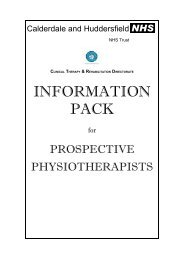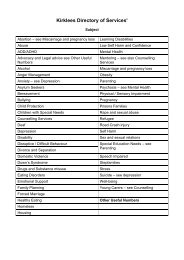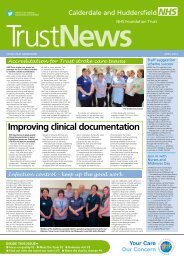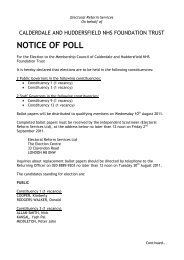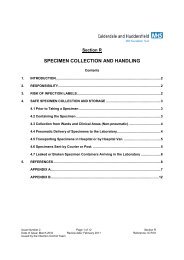Code of Governance - Calderdale and Huddersfield NHS ...
Code of Governance - Calderdale and Huddersfield NHS ...
Code of Governance - Calderdale and Huddersfield NHS ...
You also want an ePaper? Increase the reach of your titles
YUMPU automatically turns print PDFs into web optimized ePapers that Google loves.
The <strong>NHS</strong> Foundation Trust<br />
<strong>Code</strong> <strong>of</strong> <strong>Governance</strong><br />
www.monitor-nhsft.gov.uk The <strong>NHS</strong> Foundation Trust <strong>Code</strong> <strong>of</strong> <strong>Governance</strong> 1
Contents<br />
1 Introduction 4<br />
1.1 Why is there a code <strong>of</strong> governance for <strong>NHS</strong> foundation trusts? 4<br />
1.2 About this code 5<br />
1.3 Application <strong>of</strong> the code 7<br />
The <strong>NHS</strong> Foundation Trust <strong>Code</strong> <strong>of</strong> <strong>Governance</strong><br />
A Directors 9<br />
A.1 The board <strong>of</strong> directors 9<br />
A.2 Chairman <strong>and</strong> chief executive 11<br />
A.3 Balance <strong>and</strong> independence <strong>of</strong> the board <strong>of</strong> directors 12<br />
B Governors 14<br />
B.1 The board <strong>of</strong> governors 14<br />
C Appointment, resignation <strong>and</strong> terms <strong>of</strong> <strong>of</strong>fice 16<br />
C.1 Appointment to the board <strong>of</strong> directors 16<br />
C.2 Re-appointment <strong>of</strong> directors <strong>and</strong> re-election <strong>of</strong> governors 18<br />
C.3 Resignation <strong>of</strong> directors 19<br />
D Information, development <strong>and</strong> evaluation 20<br />
D.1 Information <strong>and</strong> pr<strong>of</strong>essional development 20<br />
D.2 Performance evaluation 21<br />
E Director remuneration 23<br />
E.1 The level <strong>and</strong> make-up <strong>of</strong> remuneration 23<br />
E.2 Procedure 24<br />
F Accountability <strong>and</strong> audit 26<br />
F.1 Financial, quality <strong>and</strong> operational reporting 26<br />
F.2 Internal control 27<br />
F.3 Audit committee <strong>and</strong> auditors 27<br />
G Relationships with stakeholders 30<br />
G.1 Dialogue with members, patients <strong>and</strong> the local community 30<br />
G.2 Co-operation with third parties with roles in relation to <strong>NHS</strong> foundation trusts 31<br />
Schedule A: Disclosure <strong>of</strong> corporate governance arrangements 32<br />
Appendix A: The role <strong>of</strong> the <strong>NHS</strong> foundation trust secretary 34<br />
Appendix B: The role <strong>of</strong> the nominated lead governor 35<br />
www.monitor-nhsft.gov.uk The <strong>NHS</strong> Foundation Trust <strong>Code</strong> <strong>of</strong> <strong>Governance</strong> 3
1 Introduction<br />
1.1<br />
Why is there a code <strong>of</strong> governance<br />
for <strong>NHS</strong> foundation trusts?<br />
Effective corporate governance is a fundamental<br />
cornerstone for the success <strong>of</strong> every <strong>NHS</strong><br />
foundation trust.<br />
<strong>NHS</strong> foundation trusts are created as<br />
legal entities in the form <strong>of</strong> public benefit<br />
corporations by the National Health Service<br />
Act 2006 (‘the 2006 Act’). The legislation<br />
constitutes <strong>NHS</strong> foundation trusts with a<br />
new governance regime that is fundamentally<br />
different from <strong>NHS</strong> trusts. <strong>NHS</strong> foundation<br />
trust boards <strong>of</strong> directors have more autonomy<br />
to make financial <strong>and</strong> strategic decisions.<br />
They also have a framework <strong>of</strong> local<br />
accountability through members <strong>and</strong> a board<br />
<strong>of</strong> governors, which has replaced central<br />
control from the Secretary <strong>of</strong> State for Health.<br />
In this regime, <strong>NHS</strong> foundation trust directors<br />
are ultimately <strong>and</strong> collectively responsible as<br />
a board for all aspects <strong>of</strong> the performance<br />
<strong>of</strong> the foundation trust. Therefore, they need<br />
to be able to deliver more focused strategic<br />
leadership <strong>and</strong> more effective scrutiny <strong>of</strong> the<br />
trust’s operations.<br />
The purpose <strong>of</strong> the code is to assist <strong>NHS</strong><br />
foundation trust boards in improving their<br />
governance practices by bringing together<br />
the best practice <strong>of</strong> public <strong>and</strong> private sector<br />
corporate governance. The code sets out<br />
a common overarching framework for the<br />
corporate governance <strong>of</strong> <strong>NHS</strong> foundation<br />
trusts <strong>and</strong> complements the statutory <strong>and</strong><br />
regulatory obligations on them.<br />
4 The <strong>NHS</strong> Foundation Trust <strong>Code</strong> <strong>of</strong> <strong>Governance</strong> www.monitor-nhsft.gov.uk
1.2<br />
About this code<br />
The <strong>NHS</strong> Foundation Trust <strong>Code</strong> <strong>of</strong> <strong>Governance</strong><br />
(the code) was first published in 2006. Following<br />
reviews in 2008 <strong>and</strong> 2009 <strong>of</strong> its application, <strong>and</strong><br />
also taking account <strong>of</strong> more recent developments<br />
in governance practices specific to <strong>NHS</strong><br />
foundation trusts, we have updated the code.<br />
This updated version will apply from 1 April 2010.<br />
Key aspects emphasised in the code are:<br />
• the unitary nature <strong>of</strong> the board <strong>of</strong> directors<br />
<strong>and</strong> the collective responsibility for all<br />
aspects <strong>of</strong> the performance <strong>of</strong> the foundation<br />
trust, including financial performance,<br />
clinical <strong>and</strong> service quality, management<br />
<strong>and</strong> governance;<br />
• a recommendation for at least 50% <strong>of</strong><br />
board members to be independent nonexecutive<br />
directors;<br />
• a recommendation to appoint a senior<br />
independent director;<br />
• an emphasis on actively developing<br />
the effectiveness <strong>of</strong> the board <strong>of</strong> directors<br />
through performance evaluation <strong>of</strong> the board,<br />
its committees <strong>and</strong> individual directors;<br />
• clarification on the committee structure<br />
<strong>of</strong> the board <strong>of</strong> directors <strong>and</strong> the roles<br />
<strong>of</strong> the remuneration, audit <strong>and</strong> nomination<br />
committees. This includes a recommendation<br />
for a clear nominations process;<br />
• clarification <strong>of</strong> the need for good quality<br />
information tailored to the board’s duties<br />
<strong>and</strong> availability <strong>of</strong> access to external advice;<br />
• a recommendation to appoint a secretary<br />
<strong>of</strong> the board <strong>of</strong> directors <strong>and</strong> the board <strong>of</strong><br />
governors (see Appendix A);<br />
• the role <strong>of</strong> a nominated lead governor<br />
(see Appendix B); <strong>and</strong><br />
• recommendations to be clear on the<br />
purpose <strong>and</strong> outcomes <strong>of</strong> the relationships<br />
<strong>of</strong> the <strong>NHS</strong> foundation trust with other<br />
stakeholders including members, patients,<br />
the local community, commissioners <strong>and</strong><br />
other <strong>NHS</strong> <strong>and</strong> non-<strong>NHS</strong> bodies with an<br />
interest in the local health economy.<br />
In developing the code, our approach has<br />
been to bring best practice from the private<br />
sector to the <strong>NHS</strong> foundation trust sector.<br />
The code builds on the principles <strong>and</strong><br />
provisions <strong>of</strong> the Combined <strong>Code</strong> <strong>of</strong><br />
Corporate <strong>Governance</strong> (the combined<br />
code), which is well established as the prime<br />
st<strong>and</strong>ard <strong>of</strong> corporate governance best<br />
practice for the private sector in the UK.<br />
The combined code, which was last reviewed<br />
<strong>and</strong> updated in June 2008, is the product<br />
<strong>of</strong> multiple corporate governance<br />
development efforts in the UK over many<br />
years <strong>and</strong> encompasses recommendations<br />
from the following governance reviews:<br />
• The Cadbury Report (1992) – established<br />
the basis <strong>of</strong> UK corporate governance;<br />
• The Greenbury Report (1995) – focused<br />
on director remuneration <strong>and</strong> the role<br />
<strong>of</strong> the remuneration committee, <strong>and</strong><br />
recommended remuneration disclosures;<br />
• The Hampel Report (1998) – covered<br />
multiple issues, including the composition<br />
<strong>and</strong> balance <strong>of</strong> the board <strong>and</strong> the role<br />
<strong>of</strong> directors;<br />
www.monitor-nhsft.gov.uk The <strong>NHS</strong> Foundation Trust <strong>Code</strong> <strong>of</strong> <strong>Governance</strong> 5
• The Smith Report (2003) <strong>and</strong> The Higgs<br />
Report (2003) – focused on the responsibilities<br />
<strong>of</strong> the audit committee <strong>and</strong> on the role <strong>of</strong><br />
non-executive directors respectively, following<br />
high pr<strong>of</strong>ile corporate governance failures in<br />
the US; <strong>and</strong><br />
• The Turnbull Report (2005) – concentrated<br />
in particular on aspects <strong>of</strong> risk management.<br />
A revised version <strong>of</strong> the combined code is<br />
expected to be published in mid 2010 following<br />
a period <strong>of</strong> consultation. The revised code will be<br />
known as the UK Corporate <strong>Governance</strong> <strong>Code</strong>.<br />
Some amendments were required to adapt<br />
the principles <strong>and</strong> provisions <strong>of</strong> the combined<br />
code to the <strong>NHS</strong> foundation trust statutory<br />
<strong>and</strong> regulatory environment <strong>and</strong> to make the<br />
code consistent with the public service values<br />
<strong>of</strong> foundation trusts.<br />
<strong>Governance</strong> in the public sector, <strong>and</strong><br />
specifically in the <strong>NHS</strong>, is the subject <strong>of</strong> several<br />
reports, which might also be <strong>of</strong> interest:<br />
• Nolan Principles – covered in detail the<br />
st<strong>and</strong>ards <strong>of</strong> behaviour <strong>and</strong> principles in public<br />
life with particular focus on appointment on<br />
merit, with an independent element on all<br />
selection panels recommended as the way<br />
forward for public bodies;<br />
• The Intelligent Board (2006) – looked<br />
at board level information needs;<br />
• The Integrated <strong>Governance</strong> H<strong>and</strong>book<br />
(2006) – looked in detail at the processes<br />
<strong>and</strong> information requirements <strong>of</strong> sound<br />
governance;<br />
• The Intelligent Board – modernising mental<br />
health services (2007) – focused on the<br />
board in mental health trusts; <strong>and</strong><br />
• The Healthy <strong>NHS</strong> Board: Principles for<br />
Good <strong>Governance</strong> (2010) – sets out the<br />
principles <strong>of</strong> high quality governance, <strong>and</strong><br />
is supported by a regularly updated digital<br />
compendium, which puts the principles<br />
in an operational context.<br />
6 The <strong>NHS</strong> Foundation Trust <strong>Code</strong> <strong>of</strong> <strong>Governance</strong> www.monitor-nhsft.gov.uk
1.3<br />
Application <strong>of</strong> the code<br />
This code is best practice advice. It is not<br />
m<strong>and</strong>atory guidance <strong>and</strong> accordingly, noncompliance<br />
with the provisions <strong>of</strong> the code<br />
will not in itself give rise to a breach <strong>of</strong><br />
condition 5(2) <strong>of</strong> the terms <strong>of</strong> authorisation<br />
(duty to comply with the principles <strong>of</strong> best<br />
practice on corporate governance). <strong>NHS</strong><br />
foundation trusts are, however, strongly<br />
encouraged to take full account <strong>of</strong> the best<br />
practice provisions described in this code.<br />
The code does impose some specific<br />
disclosure requirements upon <strong>NHS</strong> foundation<br />
trusts <strong>and</strong> these are set out in 2a <strong>and</strong> 2b below.<br />
<strong>NHS</strong> foundation trusts have been expected to<br />
observe in full the disclosure requirements <strong>of</strong><br />
the code since March 2008.<br />
This updated code was published in March<br />
2010 <strong>and</strong> applies from 1 April 2010.<br />
The code contains main <strong>and</strong> supporting principles<br />
<strong>and</strong> provisions. The UK Listing Authority requires<br />
listed companies to make a disclosure in two<br />
parts in relation to the combined code. Monitor<br />
requires the same <strong>of</strong> <strong>NHS</strong> foundation trusts<br />
in their annual report:<br />
2a) in the first part <strong>of</strong> the disclosure, the trust<br />
must report on how it applies the main <strong>and</strong><br />
supporting principles <strong>of</strong> the code. The form<br />
<strong>and</strong> content <strong>of</strong> this part <strong>of</strong> the statement<br />
are not prescribed, the intention being that<br />
trusts should have a free h<strong>and</strong> to explain<br />
their governance policies in the light <strong>of</strong><br />
the principles, including any special<br />
circumstances applying to them which<br />
have led to a particular approach; <strong>and</strong><br />
2b) in the second part <strong>of</strong> the disclosure, the<br />
trust must confirm via a specific statement<br />
that it complies with the provisions <strong>of</strong> the<br />
code or – where it does not – to provide<br />
an explanation. This ‘comply or explain’<br />
approach has been in operation for at least<br />
the last fifteen years in the private sector<br />
<strong>and</strong> the flexibility it <strong>of</strong>fers companies has<br />
been widely welcomed by boards.<br />
While it is expected that <strong>NHS</strong> foundation<br />
trusts will comply with the code’s provisions,<br />
it is recognised that departure from the<br />
provisions <strong>of</strong> the code may be justified in<br />
particular circumstances. Every trust should<br />
review each provision carefully <strong>and</strong> give a<br />
considered explanation if it departs from it.<br />
Some trusts may decide that the provisions<br />
are disproportionate or less relevant in their<br />
case. Such trusts may nonetheless consider<br />
that it would be appropriate to adopt the<br />
approach in the code <strong>and</strong> they are<br />
encouraged to consider this.<br />
Whilst recognising that governors are appointed<br />
<strong>and</strong> elected by members to whom the <strong>NHS</strong><br />
foundation trust is accountable, it is important<br />
that all those responsible for ensuring effective<br />
governance should do so with common sense<br />
in order to promote partnership, transparency<br />
<strong>and</strong> trust, based on mutual underst<strong>and</strong>ing.<br />
Schedule 7 to the 2006 Act sets out the various<br />
powers <strong>of</strong> <strong>and</strong> obligations upon governors<br />
<strong>of</strong> <strong>NHS</strong> foundation trusts. This code does not<br />
provide prescriptive guidance on the extent <strong>and</strong><br />
interpretation <strong>of</strong> these powers <strong>and</strong> obligations.<br />
However, Monitor has described in section B <strong>of</strong><br />
this code those areas <strong>of</strong> the governor’s role that<br />
<strong>NHS</strong> foundation trusts might see as relevant<br />
<strong>and</strong> might find helpful. In addition, in October<br />
2009, Monitor published a separate document<br />
which examines how governors can deliver<br />
www.monitor-nhsft.gov.uk The <strong>NHS</strong> Foundation Trust <strong>Code</strong> <strong>of</strong> <strong>Governance</strong> 7
their duties: Your Statutory Duties: A Reference<br />
Guide for <strong>NHS</strong> Foundation Trust Governors.<br />
Monitor will continue to oversee the effectiveness<br />
<strong>and</strong> applicability <strong>of</strong> the code <strong>and</strong> develop it,<br />
in consultation with <strong>NHS</strong> foundation trusts<br />
where appropriate, as governance best practice<br />
in the sector evolves.<br />
The code includes references to other Monitor<br />
publications, which focus on audit <strong>and</strong> on<br />
internal control:<br />
• <strong>NHS</strong> Foundation Trust Annual Reporting<br />
Manual (previously named the <strong>NHS</strong><br />
Foundation Trust Financial Reporting Manual);<br />
• <strong>NHS</strong> Foundation Trust Accounting Officer<br />
Memor<strong>and</strong>um;<br />
• Audit <strong>Code</strong> for <strong>NHS</strong> Foundation Trusts; <strong>and</strong><br />
• Guide for Governors: Audit <strong>Code</strong> for <strong>NHS</strong><br />
Foundation Trusts.<br />
For reasons <strong>of</strong> clarity <strong>and</strong> consistency, the<br />
code overlaps with existing statutory <strong>and</strong><br />
regulatory documents such as the <strong>NHS</strong><br />
Foundation Trust Model Core Constitution<br />
<strong>and</strong> the Compliance Framework.<br />
8 The <strong>NHS</strong> Foundation Trust <strong>Code</strong> <strong>of</strong> <strong>Governance</strong> www.monitor-nhsft.gov.uk
A<br />
Directors<br />
A.1<br />
The board <strong>of</strong> directors<br />
Main principle<br />
Every <strong>NHS</strong> foundation trust should be headed<br />
by an effective board <strong>of</strong> directors, since the<br />
board is collectively responsible for the exercise<br />
<strong>of</strong> the powers <strong>and</strong> the performance <strong>of</strong> the <strong>NHS</strong><br />
foundation trust.<br />
Supporting principles<br />
• The board <strong>of</strong> directors’ role is to provide<br />
effective <strong>and</strong> proactive leadership <strong>of</strong> the<br />
<strong>NHS</strong> foundation trust within a framework <strong>of</strong><br />
processes, procedures <strong>and</strong> controls which<br />
enable risk to be assessed <strong>and</strong> managed.<br />
• The board <strong>of</strong> directors is responsible for<br />
ensuring compliance by the <strong>NHS</strong> foundation<br />
trust with its terms <strong>of</strong> authorisation, its<br />
constitution, m<strong>and</strong>atory guidance issued<br />
by Monitor, relevant statutory requirements<br />
<strong>and</strong> contractual obligations.<br />
• The board <strong>of</strong> directors should set the<br />
<strong>NHS</strong> foundation trust’s strategic aims at<br />
least annually, taking into consideration the<br />
views <strong>of</strong> the board <strong>of</strong> governors, ensuring<br />
that the necessary financial <strong>and</strong> human<br />
resources are in place for the <strong>NHS</strong> foundation<br />
trust to meet its main priorities <strong>and</strong> objectives<br />
<strong>and</strong> then periodically review progress <strong>and</strong><br />
management performance.<br />
• The board <strong>of</strong> directors as a whole is<br />
responsible for ensuring the quality <strong>and</strong><br />
safety <strong>of</strong> healthcare services, education,<br />
training <strong>and</strong> research delivered by the <strong>NHS</strong><br />
foundation trust <strong>and</strong> applying the principles<br />
<strong>and</strong> st<strong>and</strong>ards <strong>of</strong> clinical governance set out<br />
by the Department <strong>of</strong> Health, the Care Quality<br />
Commission, <strong>and</strong> other relevant <strong>NHS</strong> bodies.<br />
• The board <strong>of</strong> directors should also ensure that<br />
the <strong>NHS</strong> foundation trust exercises its functions<br />
effectively, efficiently <strong>and</strong> economically.<br />
• The board <strong>of</strong> directors should set the <strong>NHS</strong><br />
foundation trust’s vision, values <strong>and</strong> st<strong>and</strong>ards<br />
<strong>of</strong> conduct <strong>and</strong> ensure that its obligations to its<br />
members, patients <strong>and</strong> other stakeholders are<br />
understood, clearly communicated <strong>and</strong> met.<br />
• All directors must take decisions objectively<br />
in the interests <strong>of</strong> the <strong>NHS</strong> foundation trust.<br />
• All members <strong>of</strong> the board <strong>of</strong> directors have<br />
joint responsibility for every decision <strong>of</strong> the<br />
board regardless <strong>of</strong> their individual skills<br />
or status. This does not impact upon the<br />
particular responsibilities <strong>of</strong> the chief executive<br />
as the accounting <strong>of</strong>ficer. The chief executive<br />
should refer to the latest guidance from Monitor<br />
on the responsibilities <strong>and</strong> obligations <strong>of</strong> the<br />
accounting <strong>of</strong>ficer (<strong>NHS</strong> Foundation Trust<br />
Accounting Officer Memor<strong>and</strong>um, April 2008).<br />
• The concept <strong>of</strong> the unitary board refers to<br />
the fact that within the board <strong>of</strong> directors<br />
the non-executive directors <strong>and</strong> the executive<br />
directors share the same liability. All directors,<br />
executive <strong>and</strong> non-executive, have<br />
responsibility to constructively challenge<br />
the decisions <strong>of</strong> the board <strong>and</strong> help develop<br />
proposals on priorities, risk mitigation, values,<br />
st<strong>and</strong>ards <strong>and</strong> strategy.<br />
• As part <strong>of</strong> their role as members <strong>of</strong> a unitary<br />
board, non-executive directors have a particular<br />
duty to ensure appropriate challenge is made.<br />
Non-executive directors should scrutinise the<br />
performance <strong>of</strong> the executive management in<br />
www.monitor-nhsft.gov.uk The <strong>NHS</strong> Foundation Trust <strong>Code</strong> <strong>of</strong> <strong>Governance</strong> 9
meeting agreed goals <strong>and</strong> objectives,<br />
receive adequate information <strong>and</strong> monitor<br />
the reporting <strong>of</strong> performance. They should<br />
satisfy themselves as to the integrity <strong>of</strong><br />
financial, clinical <strong>and</strong> other information, <strong>and</strong><br />
that financial <strong>and</strong> clinical quality controls <strong>and</strong><br />
systems <strong>of</strong> risk management <strong>and</strong> governance<br />
are robust <strong>and</strong> implemented. Non-executive<br />
directors are responsible for determining<br />
appropriate levels <strong>of</strong> remuneration <strong>of</strong> executive<br />
directors <strong>and</strong> have a prime role in appointing,<br />
<strong>and</strong> where necessary removing, executive<br />
directors, <strong>and</strong> in succession planning.<br />
<strong>Code</strong> provisions<br />
A.1.1 The board <strong>of</strong> directors should meet<br />
sufficiently regularly to discharge its duties<br />
effectively. There should be a formal schedule<br />
<strong>of</strong> matters specifically reserved for decision by<br />
the board <strong>of</strong> directors. The schedule <strong>of</strong> matters<br />
reserved for the board <strong>of</strong> directors should be<br />
complemented with a clear statement detailing<br />
the roles <strong>and</strong> responsibilities <strong>of</strong> the board<br />
<strong>of</strong> governors (as described in B.1.4). There<br />
should also be a statement explaining how any<br />
disagreements between the board <strong>of</strong> governors<br />
<strong>and</strong> the board <strong>of</strong> directors will be resolved. The<br />
annual report should include a statement <strong>of</strong> how<br />
the board <strong>of</strong> directors <strong>and</strong> the board <strong>of</strong> governors<br />
operate, including a high-level statement <strong>of</strong> which<br />
types <strong>of</strong> decisions are to be taken by each <strong>of</strong> the<br />
boards <strong>and</strong> which decisions are to be delegated<br />
to the executive management by the board<br />
<strong>of</strong> directors. The developmental nature <strong>of</strong> the<br />
board <strong>of</strong> governors’ role would suggest that<br />
any agreements should be kept under review<br />
as the role evolves.<br />
A.1.2 The annual report should identify<br />
the chairman, the deputy chairman (where<br />
there is one), the chief executive, the senior<br />
independent director (see A.3.3) <strong>and</strong> the<br />
chairmen <strong>and</strong> members <strong>of</strong> the nominations,<br />
audit <strong>and</strong> remuneration committees. A record<br />
should be kept <strong>of</strong> the number <strong>of</strong> meetings <strong>of</strong><br />
the board <strong>of</strong> directors <strong>and</strong> the attendance <strong>of</strong><br />
individual directors, <strong>and</strong> it should be supplied<br />
to the board <strong>of</strong> governors on request.<br />
A.1.3 The chairman should hold meetings<br />
with the non-executive directors without<br />
the executives present. Led by the senior<br />
independent director, the non-executive<br />
directors should meet without the chairman<br />
at least annually to evaluate the chairman’s<br />
performance, as part <strong>of</strong> a process which<br />
should be agreed with the board <strong>of</strong> governors,<br />
for appraising the chair <strong>and</strong> on such other<br />
occasions as are deemed appropriate.<br />
A.1.4 The board <strong>of</strong> directors should make<br />
available a statement <strong>of</strong> the objectives <strong>of</strong> the<br />
<strong>NHS</strong> foundation trust showing how it intends<br />
to balance the interests <strong>of</strong> patients, the local<br />
community <strong>and</strong> other stakeholders, <strong>and</strong> use<br />
this as the basis for its decision making <strong>and</strong><br />
forward planning.<br />
A.1.5 The board <strong>of</strong> directors should<br />
ensure that adequate systems <strong>and</strong> processes<br />
are maintained to measure <strong>and</strong> monitor the<br />
<strong>NHS</strong> foundation trust’s effectiveness, efficiency<br />
<strong>and</strong> economy as well as the quality <strong>of</strong> its<br />
healthcare delivery. The board should regularly<br />
review the performance <strong>of</strong> the <strong>NHS</strong> foundation<br />
trust in these areas against regulatory <strong>and</strong><br />
contractual obligations <strong>and</strong> approved plans<br />
<strong>and</strong> objectives.<br />
The board <strong>of</strong> directors should ensure that<br />
relevant metrics, measures, milestones <strong>and</strong><br />
accountabilities are developed <strong>and</strong> agreed<br />
so as to underst<strong>and</strong> <strong>and</strong> assess progress<br />
<strong>and</strong> delivery <strong>of</strong> performance. Where<br />
appropriate, <strong>and</strong> in particular in high risk<br />
or complex areas, independent advice<br />
10 The <strong>NHS</strong> Foundation Trust <strong>Code</strong> <strong>of</strong> <strong>Governance</strong> www.monitor-nhsft.gov.uk
should be commissioned by the board <strong>of</strong><br />
directors to provide an adequate <strong>and</strong> reliable<br />
level <strong>of</strong> assurance.<br />
A.1.6 The board <strong>of</strong> directors should report<br />
on its approach to clinical governance <strong>and</strong> its<br />
plan for the improvement <strong>of</strong> clinical quality in<br />
accordance with guidance set out by the<br />
Department <strong>of</strong> Health, the Care Quality<br />
Commission <strong>and</strong> Monitor.<br />
A.1.7 Where the board or individual<br />
directors have concerns which remain<br />
unresolved, about the running <strong>of</strong> the <strong>NHS</strong><br />
foundation trust or a proposed action, they<br />
should ensure that their concerns are recorded<br />
in the board minutes.<br />
A.1.8 The chief executive, as the<br />
accounting <strong>of</strong>ficer, should follow the procedure<br />
set out by Monitor (<strong>NHS</strong> Foundation Trust<br />
Accounting Officer Memor<strong>and</strong>um, April 2008)<br />
for advising the board <strong>of</strong> directors <strong>and</strong> the board<br />
<strong>of</strong> governors, <strong>and</strong> for recording <strong>and</strong> submitting<br />
objections to decisions considered or taken<br />
by the boards in matters <strong>of</strong> propriety or<br />
regularity, <strong>and</strong> on issues relating to the wider<br />
responsibilities <strong>of</strong> the accounting <strong>of</strong>ficer for<br />
economy, efficiency <strong>and</strong> effectiveness.<br />
A.1.9 The board <strong>of</strong> directors should<br />
establish the values <strong>and</strong> st<strong>and</strong>ards <strong>of</strong> conduct<br />
for the <strong>NHS</strong> foundation trust <strong>and</strong> its staff in<br />
accordance with <strong>NHS</strong> values <strong>and</strong> accepted<br />
st<strong>and</strong>ards <strong>of</strong> behaviour in public life, which<br />
include the principles <strong>of</strong> selflessness, integrity,<br />
objectivity, accountability, openness, honesty<br />
<strong>and</strong> leadership (The Nolan Principles).<br />
A.1.10 The board <strong>of</strong> directors should<br />
operate a code <strong>of</strong> conduct that builds on the<br />
values <strong>of</strong> the <strong>NHS</strong> foundation trust <strong>and</strong> reflect<br />
high st<strong>and</strong>ards <strong>of</strong> probity <strong>and</strong> responsibility.<br />
The board <strong>of</strong> directors should follow a policy<br />
<strong>of</strong> openness <strong>and</strong> transparency in its<br />
proceedings <strong>and</strong> decision making unless<br />
this conflicts with a need to protect the wider<br />
interests <strong>of</strong> the public or the <strong>NHS</strong> foundation<br />
trust (including commercial-in-confidence<br />
matters) <strong>and</strong> make clear how potential<br />
conflicts <strong>of</strong> interest are dealt with.<br />
A.1.11 The <strong>NHS</strong> foundation trust should<br />
arrange appropriate insurance to cover the<br />
risk <strong>of</strong> legal action against its directors.<br />
A.2<br />
Chairman <strong>and</strong> chief executive<br />
Main principle<br />
There should be a clear division <strong>of</strong> responsibilities<br />
at the head <strong>of</strong> the <strong>NHS</strong> foundation trust between<br />
the chairing <strong>of</strong> the boards <strong>of</strong> directors <strong>and</strong><br />
governors <strong>and</strong> the executive responsibility<br />
for the running <strong>of</strong> the <strong>NHS</strong> foundation trust’s<br />
business. No one individual should have<br />
unfettered powers <strong>of</strong> decision.<br />
Supporting principles<br />
• The chairman is responsible for leadership<br />
<strong>of</strong> the board <strong>of</strong> directors <strong>and</strong> the board <strong>of</strong><br />
governors, ensuring their effectiveness on all<br />
aspects <strong>of</strong> their role <strong>and</strong> setting their agenda.<br />
• The chairman is responsible for ensuring<br />
that the two boards work together effectively.<br />
• The chairman is also responsible for<br />
ensuring that directors <strong>and</strong> governors<br />
receive accurate, timely <strong>and</strong> clear information<br />
that is appropriate for their respective duties.<br />
www.monitor-nhsft.gov.uk The <strong>NHS</strong> Foundation Trust <strong>Code</strong> <strong>of</strong> <strong>Governance</strong> 11
• The chairman should ensure effective <strong>and</strong><br />
open communication with patients, clients,<br />
members, staff <strong>and</strong> other stakeholders.<br />
• The chairman should also facilitate the effective<br />
contribution <strong>of</strong> all executive <strong>and</strong> non-executive<br />
directors <strong>and</strong> ensure that constructive <strong>and</strong><br />
productive relations exist between executive<br />
<strong>and</strong> non-executive directors, <strong>and</strong> between the<br />
board <strong>of</strong> directors <strong>and</strong> the board <strong>of</strong> governors.<br />
<strong>Code</strong> provisions<br />
A.2.1 The division <strong>of</strong> responsibilities between<br />
the chairman <strong>and</strong> chief executive should be<br />
clearly established, set out in writing <strong>and</strong><br />
agreed by the board <strong>of</strong> directors.<br />
A.2.2 The chairman should on<br />
appointment meet the independence criteria<br />
set out in A.3.1 below. A chief executive<br />
should not go on to be chairman <strong>of</strong> the<br />
same <strong>NHS</strong> foundation trust.<br />
A.3<br />
Balance <strong>and</strong> independence<br />
<strong>of</strong> the board <strong>of</strong> directors<br />
Main principle<br />
The board <strong>of</strong> directors should include a balance<br />
<strong>of</strong> executive <strong>and</strong> non-executive directors (<strong>and</strong> in<br />
particular independent non-executive directors)<br />
such that no individual or small group <strong>of</strong> individuals<br />
can dominate the board’s decision taking.<br />
All directors should be able to exercise one full<br />
vote, with the chairman having a second casting<br />
vote on occasions where a decision is tied.<br />
Supporting principles<br />
• The board <strong>of</strong> directors should not be so large<br />
as to be unwieldy. The board <strong>of</strong> directors<br />
should be <strong>of</strong> sufficient size that the balance<br />
<strong>of</strong> skills <strong>and</strong> experience is appropriate for<br />
the requirements <strong>of</strong> the business <strong>and</strong> that<br />
changes to its composition can be managed<br />
without undue disruption.<br />
• To ensure that power <strong>and</strong> information are not<br />
concentrated in one or two individuals, there<br />
should be a strong presence on the board <strong>of</strong><br />
both executive <strong>and</strong> non-executive directors.<br />
• The value <strong>of</strong> ensuring that committee<br />
membership is refreshed <strong>and</strong> that undue<br />
reliance is not placed on particular individuals<br />
should be taken into account in deciding<br />
chairmanship <strong>and</strong> membership <strong>of</strong> committees.<br />
• Only the committee chairman <strong>and</strong> relevant<br />
members are entitled to be present at<br />
a meeting <strong>of</strong> the nominations, audit or<br />
remuneration committees, but others may<br />
attend by invitation <strong>of</strong> the relevant committee.<br />
<strong>Code</strong> provisions<br />
A.3.1 The board <strong>of</strong> directors should<br />
identify in the annual report each nonexecutive<br />
director it considers to be<br />
independent. The board should determine<br />
whether the director is independent in<br />
character <strong>and</strong> judgement <strong>and</strong> whether there<br />
are relationships or circumstances which are<br />
likely to affect, or could appear to affect, the<br />
director’s judgement. The board <strong>of</strong> directors<br />
should state its reasons if it determines<br />
that a director is independent notwithst<strong>and</strong>ing<br />
the existence <strong>of</strong> relationships or circumstances<br />
which may appear relevant to its<br />
determination, including if the director:<br />
12 The <strong>NHS</strong> Foundation Trust <strong>Code</strong> <strong>of</strong> <strong>Governance</strong> www.monitor-nhsft.gov.uk
• has been an employee <strong>of</strong> the <strong>NHS</strong> foundation<br />
trust within the last five years;<br />
• has, or has had within the last three years,<br />
a material business relationship with the<br />
<strong>NHS</strong> foundation trust either directly, or<br />
as a partner, shareholder, director or<br />
senior employee <strong>of</strong> a body that has such<br />
a relationship with the <strong>NHS</strong> foundation trust;<br />
• has received or receives additional<br />
remuneration from the <strong>NHS</strong> foundation trust<br />
apart from a director’s fee, participates in<br />
the <strong>NHS</strong> foundation trust’s performancerelated<br />
pay scheme, or is a member <strong>of</strong> the<br />
<strong>NHS</strong> foundation trust’s pension scheme;<br />
• has close family ties with any <strong>of</strong> the <strong>NHS</strong><br />
foundation trust’s advisers, directors or<br />
senior employees;<br />
• holds cross-directorships or has significant<br />
links with other directors through involvement<br />
in other companies or bodies;<br />
• has served on the board <strong>of</strong> the <strong>NHS</strong><br />
foundation trust for more than six years<br />
from the date <strong>of</strong> their first appointment; or<br />
• is an appointed representative <strong>of</strong> the<br />
<strong>NHS</strong> foundation trust’s university medical<br />
or dental school.<br />
have concerns which contact through the<br />
normal channels <strong>of</strong> chairman, chief executive<br />
or finance director has failed to resolve or<br />
for which such contact is inappropriate.<br />
The senior independent director could be<br />
the deputy chairman.<br />
A.3.4 The board <strong>of</strong> directors should<br />
include in its annual report a description <strong>of</strong><br />
each director’s skills, expertise <strong>and</strong> experience.<br />
Alongside this in the annual report, the board<br />
should make a clear statement about its own<br />
balance, completeness <strong>and</strong> appropriateness<br />
to the requirements <strong>of</strong> the <strong>NHS</strong> foundation<br />
trust. Both statements should also be available<br />
on the <strong>NHS</strong> foundation trust’s website.<br />
A.3.5 No individual should hold, at the<br />
same time, positions <strong>of</strong> director <strong>and</strong> governor<br />
<strong>of</strong> <strong>NHS</strong> foundation trusts.<br />
A.3.6 Non-executive directors should<br />
receive the necessary information <strong>and</strong> feel<br />
able to raise appropriate challenge <strong>of</strong><br />
recommendations or decisions <strong>of</strong> the board,<br />
in particular making full use <strong>of</strong> their skills <strong>and</strong><br />
experience gained both as a director <strong>of</strong> the<br />
trust <strong>and</strong> also in other leadership roles. They<br />
should expect <strong>and</strong> apply similar st<strong>and</strong>ards <strong>of</strong><br />
care <strong>and</strong> quality in their role as a non-executive<br />
director <strong>of</strong> an <strong>NHS</strong> foundation trust as they<br />
would in other similar roles.<br />
A.3.2 At least half the board <strong>of</strong> directors,<br />
excluding the chairman, should comprise nonexecutive<br />
directors determined by the board to<br />
be independent.<br />
A.3.3 The board <strong>of</strong> directors should<br />
appoint one <strong>of</strong> the independent non-executive<br />
directors to be the senior independent director,<br />
in consultation with the board <strong>of</strong> governors.<br />
The senior independent director should be<br />
available to members <strong>and</strong> governors if they<br />
www.monitor-nhsft.gov.uk The <strong>NHS</strong> Foundation Trust <strong>Code</strong> <strong>of</strong> <strong>Governance</strong> 13
B Governors<br />
Schedule 7 to the 2006 Act sets out the<br />
various powers <strong>of</strong>, <strong>and</strong> obligations upon,<br />
governors <strong>of</strong> <strong>NHS</strong> foundation trusts. The code<br />
does not provide prescriptive guidance on the<br />
extent <strong>and</strong> interpretation <strong>of</strong> these powers <strong>and</strong><br />
obligations. However, Monitor has described<br />
in this section <strong>of</strong> the code those areas <strong>of</strong> the<br />
governor’s role that are relevant <strong>and</strong> which<br />
<strong>NHS</strong> foundation trusts might find helpful.<br />
In addition, in October 2009, Monitor<br />
published a separate document which<br />
examines how governors can deliver their<br />
duties: Your Statutory Duties: A Reference<br />
Guide for <strong>NHS</strong> Foundation Trust Governors.<br />
B.1<br />
The board <strong>of</strong> governors<br />
Main principle<br />
Every <strong>NHS</strong> foundation trust will have a board <strong>of</strong><br />
governors which is responsible for representing<br />
the interests <strong>of</strong> <strong>NHS</strong> foundation trust members<br />
<strong>and</strong> partner organisations in the local health<br />
economy in the governance <strong>of</strong> the <strong>NHS</strong><br />
foundation trust.<br />
Governors must act in the best interests <strong>of</strong> the<br />
<strong>NHS</strong> foundation trust <strong>and</strong> should adhere to its<br />
values <strong>and</strong> code <strong>of</strong> conduct.<br />
The board <strong>of</strong> governors should hold the board<br />
<strong>of</strong> directors to account for the performance<br />
<strong>of</strong> the trust, including ensuring the board<br />
<strong>of</strong> directors acts so that the foundation trust<br />
does not breach the terms <strong>of</strong> its authorisation.<br />
It remains the responsibility <strong>of</strong> the board <strong>of</strong><br />
directors to design <strong>and</strong> then implement agreed<br />
priorities, objectives <strong>and</strong> the overall strategy<br />
<strong>of</strong> the <strong>NHS</strong> foundation trust.<br />
Governors are responsible for regularly feeding<br />
back information about the trust, its vision <strong>and</strong><br />
its performance to the constituencies <strong>and</strong> the<br />
stakeholder organisations that either elected<br />
or appointed them.<br />
Supporting principles<br />
• Governors should discuss <strong>and</strong> agree<br />
with the board <strong>of</strong> directors how they will<br />
undertake these <strong>and</strong> any other additional<br />
roles, giving due consideration to the<br />
circumstances <strong>of</strong> the <strong>NHS</strong> foundation trust<br />
<strong>and</strong> the needs <strong>of</strong> the local community <strong>and</strong><br />
emerging best practice.<br />
• Governors should work closely with the<br />
board <strong>of</strong> directors <strong>and</strong> must be presented<br />
with, for consideration, the annual report<br />
<strong>and</strong> accounts <strong>and</strong> the annual plan at a<br />
general meeting. The governors can expect<br />
to be consulted on the development <strong>of</strong><br />
forward plans for the trust <strong>and</strong> any significant<br />
changes to the delivery <strong>of</strong> the trust’s<br />
business plan.<br />
<strong>Code</strong> provisions<br />
B.1.1 The board <strong>of</strong> governors should<br />
meet sufficiently regularly to discharge its<br />
duties. Typically the board <strong>of</strong> governors<br />
would be expected to meet as a full board<br />
at least four times per year. Governors should<br />
where practicable make every effort to attend<br />
the meetings <strong>of</strong> the board <strong>of</strong> governors.<br />
The <strong>NHS</strong> foundation trust should take<br />
appropriate steps to facilitate attendance.<br />
B.1.2 The board <strong>of</strong> governors should<br />
not be so large as to be unwieldy. The board<br />
<strong>of</strong> governors should be <strong>of</strong> sufficient size<br />
for the requirements <strong>of</strong> its duties. The roles,<br />
14 The <strong>NHS</strong> Foundation Trust <strong>Code</strong> <strong>of</strong> <strong>Governance</strong> www.monitor-nhsft.gov.uk
structure, composition, <strong>and</strong> procedures<br />
<strong>of</strong> the board <strong>of</strong> governors should be reviewed<br />
regularly as described in provision D.2.2.<br />
B.1.3 The annual report should identify<br />
the members <strong>of</strong> the board <strong>of</strong> governors,<br />
including a description <strong>of</strong> the constituency<br />
or organisation that they represent, whether<br />
they were elected or appointed, <strong>and</strong> the<br />
duration <strong>of</strong> their appointments. The annual<br />
report should also identify the nominated<br />
lead governor. A record should be kept <strong>of</strong><br />
the number <strong>of</strong> meetings <strong>of</strong> the board <strong>and</strong><br />
the attendance <strong>of</strong> individual governors <strong>and</strong><br />
it should be made available to members<br />
on request.<br />
B.1.4 The roles <strong>and</strong> responsibilities<br />
<strong>of</strong> the board <strong>of</strong> governors should be set<br />
out in a written document. This statement<br />
should include a clear explanation <strong>of</strong> the<br />
responsibilities <strong>of</strong> the board <strong>of</strong> governors<br />
towards members <strong>and</strong> other stakeholders<br />
<strong>and</strong> how governors will seek their views<br />
<strong>and</strong> inform them.<br />
B.1.5 The board <strong>of</strong> governors should<br />
receive <strong>and</strong> consider other appropriate<br />
information required to enable it to discharge<br />
its duties, for example, clinical <strong>and</strong><br />
operational data.<br />
B.1.6 The chairman is responsible for<br />
leadership <strong>of</strong> both boards (see A.2) but the<br />
governors also have a responsibility to make<br />
the arrangements work <strong>and</strong> should take the<br />
lead in inviting the chief executive to their<br />
meetings <strong>and</strong> inviting attendance by other<br />
executives <strong>and</strong> non-executives as appropriate.<br />
In these meetings other members <strong>of</strong> the<br />
board <strong>of</strong> governors may raise questions <strong>of</strong> the<br />
chairman or his/her deputy or any other director<br />
present at the meeting about the affairs <strong>of</strong><br />
the <strong>NHS</strong> foundation trust.<br />
B.1.7 The board <strong>of</strong> governors should<br />
establish a policy for engagement with the<br />
board <strong>of</strong> directors for those circumstances<br />
when they have concerns about the<br />
performance <strong>of</strong> the board <strong>of</strong> directors,<br />
compliance with the terms <strong>of</strong> authorisation or<br />
other matters related to the general wellbeing<br />
<strong>of</strong> the <strong>NHS</strong> foundation trust. The board <strong>of</strong><br />
governors should consider the advantages<br />
<strong>of</strong> there being a senior independent director<br />
on the board <strong>of</strong> directors (see A.3.3).<br />
B.1.8 The board <strong>of</strong> governors should<br />
ensure its interaction <strong>and</strong> relationship with the<br />
board <strong>of</strong> directors is appropriate <strong>and</strong> effective,<br />
in particular, by agreeing the availability <strong>and</strong><br />
timely communication <strong>of</strong> relevant information,<br />
discussion <strong>and</strong> the setting in advance <strong>of</strong><br />
meeting agendas <strong>and</strong> use, where possible,<br />
<strong>of</strong> clear, unambiguous language.<br />
B.1.9 Governors should acknowledge the<br />
overall responsibility <strong>of</strong> the board <strong>of</strong> directors<br />
for running the <strong>NHS</strong> foundation trust <strong>and</strong> should<br />
not use the powers <strong>of</strong> the board <strong>of</strong> governors<br />
to veto the decisions <strong>of</strong> the board <strong>of</strong> directors<br />
or otherwise obstruct the implementation<br />
<strong>of</strong> agreed actions <strong>and</strong> strategies. Through<br />
the nominated lead governor, the board <strong>of</strong><br />
governors should communicate directly with<br />
Monitor if the <strong>NHS</strong> foundation trust is at risk<br />
<strong>of</strong> significantly breaching the terms <strong>of</strong> its<br />
authorisation <strong>and</strong> if these concerns cannot<br />
be satisfactorily resolved.<br />
B.1.10 The board <strong>of</strong> governors should<br />
only exercise its power to remove the chairman<br />
or any non-executive directors after exhausting<br />
all other means <strong>of</strong> engagement with the board<br />
<strong>of</strong> directors.<br />
www.monitor-nhsft.gov.uk The <strong>NHS</strong> Foundation Trust <strong>Code</strong> <strong>of</strong> <strong>Governance</strong> 15
C<br />
Appointment,<br />
resignation<br />
<strong>and</strong> terms <strong>of</strong> <strong>of</strong>fice<br />
C.1<br />
Appointment to the board<br />
<strong>of</strong> directors<br />
Main principle<br />
The 2006 Act sets out how appointments to<br />
the board <strong>of</strong> directors are made. There should<br />
be a formal, rigorous <strong>and</strong> transparent<br />
procedure for the appointment <strong>of</strong> directors.<br />
Supporting principles<br />
• Appointments to the board <strong>of</strong> directors<br />
should be made on merit <strong>and</strong> based on<br />
objective criteria.<br />
• Care should be taken to ensure that<br />
new appointees have relevant skills <strong>and</strong><br />
experience to complement other members<br />
<strong>of</strong> the board <strong>and</strong> enough time to devote to<br />
the job. This is particularly important in the<br />
case <strong>of</strong> chairmanships.<br />
• The board <strong>of</strong> directors should also satisfy<br />
itself that plans are in place for orderly<br />
succession <strong>of</strong> appointments to the board<br />
so as to maintain an appropriate balance<br />
<strong>of</strong> skills <strong>and</strong> experience within the <strong>NHS</strong><br />
foundation trust <strong>and</strong> on the board.<br />
<strong>Code</strong> provisions<br />
C.1.1 The nominations committee<br />
or committees, with external advice<br />
as appropriate, are responsible for the<br />
identification <strong>and</strong> nomination <strong>of</strong> executive<br />
<strong>and</strong> non-executive directors. The nominations<br />
committee should give full consideration to<br />
succession planning, taking into account<br />
the future challenges, risks <strong>and</strong> opportunities<br />
facing the <strong>NHS</strong> foundation trust <strong>and</strong> the<br />
skills <strong>and</strong> expertise required within the board<br />
<strong>of</strong> directors to meet them.<br />
C.1.2 There may be one or two nominations<br />
committees. If there are two committees, one<br />
will be responsible for considering nominations<br />
for executive directors <strong>and</strong> the other for nonexecutive<br />
directors (including the chairman).<br />
The nominations committee(s) should regularly<br />
review the structure, size <strong>and</strong> composition <strong>of</strong> the<br />
board <strong>of</strong> directors <strong>and</strong> make recommendations<br />
for changes where appropriate. In particular, the<br />
nominations committee(s) should evaluate the<br />
balance <strong>of</strong> skills, knowledge <strong>and</strong> experience<br />
on the board <strong>of</strong> directors <strong>and</strong>, in the light <strong>of</strong> this<br />
evaluation, prepare a description <strong>of</strong> the role <strong>and</strong><br />
capabilities required for appointment <strong>of</strong> both<br />
executive <strong>and</strong> non-executive directors,<br />
including the chairman.<br />
C.1.3 The chairman or an independent<br />
non-executive director should chair the<br />
nominations committee(s).<br />
C.1.4 The governors are responsible<br />
at a general meeting for the appointment,<br />
re-appointment <strong>and</strong> removal <strong>of</strong> the chairman<br />
<strong>and</strong> the other non-executive directors.<br />
They should agree with the nominations<br />
committee a clear process for the nomination<br />
<strong>of</strong> a new chair <strong>and</strong> non-executive directors.<br />
Once suitable c<strong>and</strong>idates have been identified<br />
the nominations committee should make<br />
recommendations to the board <strong>of</strong> governors.<br />
C.1.5 Where an <strong>NHS</strong> foundation trust has<br />
two nominations committees, the nominations<br />
committee responsible for the appointment<br />
<strong>of</strong> non-executive directors should consist <strong>of</strong><br />
a majority <strong>of</strong> governors.<br />
16 The <strong>NHS</strong> Foundation Trust <strong>Code</strong> <strong>of</strong> <strong>Governance</strong> www.monitor-nhsft.gov.uk
If only one nominations committee exists,<br />
when nominations for non-executives, including<br />
the appointment <strong>of</strong> a chairman or a deputy<br />
chairman, are being discussed, there should<br />
be a majority <strong>of</strong> governors on the committee<br />
<strong>and</strong> also a majority governor representation<br />
on the interview panel.<br />
C.1.6 When considering the appointment <strong>of</strong><br />
non-executive directors, the board <strong>of</strong> governors<br />
should take into account the views <strong>of</strong> the board<br />
<strong>of</strong> directors on the qualifications, skills <strong>and</strong><br />
experience required for each position.<br />
C.1.7 For the appointment <strong>of</strong> a chairman,<br />
the nominations committee should prepare<br />
a job specification defining the role <strong>and</strong><br />
capabilities required including an assessment<br />
<strong>of</strong> the time commitment expected, recognising<br />
the need for availability in the event <strong>of</strong><br />
emergencies. A chairman’s other significant<br />
commitments should be disclosed to the<br />
board <strong>of</strong> governors before appointment<br />
<strong>and</strong> included in the annual report. Changes<br />
to such commitments should be reported<br />
to the board <strong>of</strong> governors as they arise,<br />
<strong>and</strong> included in the next annual report.<br />
No individual, simultaneously whilst being<br />
a chairman <strong>of</strong> an <strong>NHS</strong> foundation trust, should<br />
be the substantive chairman <strong>of</strong> another <strong>NHS</strong><br />
foundation trust.<br />
C.1.8 The terms <strong>and</strong> conditions <strong>of</strong><br />
appointment <strong>of</strong> non-executive directors should<br />
be made available for inspection. The letter <strong>of</strong><br />
appointment should set out the expected time<br />
commitment. Non-executive directors should<br />
undertake that they will have sufficient time<br />
to meet what is expected <strong>of</strong> them. Their other<br />
significant commitments should be disclosed<br />
to the board <strong>of</strong> governors before appointment,<br />
with a broad indication <strong>of</strong> the time involved<br />
<strong>and</strong> the board <strong>of</strong> governors should be<br />
informed <strong>of</strong> subsequent changes.<br />
C.1.9 The annual report should<br />
describe the process followed by the board<br />
<strong>of</strong> governors in relation to appointments<br />
<strong>of</strong> the chairman <strong>and</strong> non-executive directors.<br />
C.1.10 It is a requirement <strong>of</strong> the 2006<br />
Act that the chairman, the other nonexecutive<br />
directors <strong>and</strong> – except in the<br />
case <strong>of</strong> the appointment <strong>of</strong> a chief executive<br />
– the chief executive, are responsible for<br />
deciding the appointment <strong>of</strong> executive<br />
directors. The nominations committee<br />
with responsibility for executive director<br />
nominations should identify suitable<br />
c<strong>and</strong>idates to fill executive director vacancies<br />
as they arise <strong>and</strong> make recommendations<br />
to the chairman, the other non-executives<br />
directors <strong>and</strong>, except in the case <strong>of</strong> the<br />
appointment <strong>of</strong> a chief executive, the<br />
chief executive.<br />
C.1.11 It is for the non-executive<br />
directors to appoint <strong>and</strong> remove the chief<br />
executive. The appointment <strong>of</strong> a chief<br />
executive requires the approval <strong>of</strong> the<br />
board <strong>of</strong> governors.<br />
C.1.12 An independent external adviser<br />
should not be a member <strong>of</strong> or have a vote<br />
on the nominations committee(s).<br />
C.1.13 The board <strong>of</strong> directors should<br />
not agree to a full-time executive director<br />
taking on more than one non-executive<br />
directorship <strong>of</strong> an <strong>NHS</strong> foundation trust<br />
or another organisation <strong>of</strong> comparable size<br />
<strong>and</strong> complexity, nor the chairmanship <strong>of</strong><br />
such an organisation.<br />
C.1.14 A separate section <strong>of</strong> the annual<br />
report should describe the work <strong>of</strong> the<br />
nominations committee(s), including the<br />
process it has used in relation to board<br />
appointments.<br />
www.monitor-nhsft.gov.uk The <strong>NHS</strong> Foundation Trust <strong>Code</strong> <strong>of</strong> <strong>Governance</strong> 17
C.2<br />
Re-appointment <strong>of</strong> directors<br />
<strong>and</strong> re-election <strong>of</strong> governors<br />
Main principle<br />
All non-executive directors <strong>and</strong> elected governors<br />
should be submitted for re-appointment or<br />
re-election at regular intervals. The performance<br />
<strong>of</strong> executive directors <strong>of</strong> the board should be<br />
subject to regular appraisal <strong>and</strong> review. The<br />
board <strong>of</strong> directors should ensure planned <strong>and</strong><br />
progressive refreshing <strong>of</strong> the board.<br />
<strong>Code</strong> provisions<br />
C.2.1 Approval by the board <strong>of</strong> governors<br />
<strong>of</strong> the appointment <strong>of</strong> a chief executive should<br />
be a subject <strong>of</strong> the first general meeting after<br />
the appointment by a committee <strong>of</strong> the<br />
chairman <strong>and</strong> non-executive directors. All other<br />
executive directors should be appointed by a<br />
committee <strong>of</strong> the chief executive, the chairman<br />
<strong>and</strong> non-executive directors.<br />
C.2.2 Non-executive directors, including<br />
the chairman, should be appointed by the<br />
board <strong>of</strong> governors for specified terms subject<br />
to re-appointment thereafter at intervals <strong>of</strong> no<br />
more than three years <strong>and</strong> to the 2006 Act<br />
provisions relating to the removal <strong>of</strong> a director.<br />
The chairman should confirm to the governors<br />
that, following formal performance evaluation,<br />
the performance <strong>of</strong> the individual proposed<br />
for re-appointment continues to be effective<br />
<strong>and</strong> to demonstrate commitment to the role.<br />
Any term beyond six years (e.g. two threeyear<br />
terms) for a non-executive director<br />
should be subject to particularly rigorous<br />
review, <strong>and</strong> should take into account the<br />
need for progressive refreshing <strong>of</strong> the board.<br />
Non-executive directors may in exceptional<br />
circumstances serve longer than six years<br />
(e.g. two three-year terms following<br />
authorisation <strong>of</strong> the <strong>NHS</strong> foundation trust),<br />
but subject to annual re-appointment. Serving<br />
more than six years could be relevant to the<br />
determination <strong>of</strong> a non-executive director’s<br />
independence (as set out in provision A.3.1).<br />
C.2.3 Elected governors must be<br />
subject to re-election by the members <strong>of</strong> their<br />
constituency at regular intervals not exceeding<br />
three years. The names <strong>of</strong> governors submitted<br />
for election or re-election should be accompanied<br />
by sufficient biographical details <strong>and</strong> any other<br />
relevant information to enable members to take<br />
an informed decision on their election. This<br />
should include prior performance information<br />
such as attendance records at governor<br />
meetings <strong>and</strong> other relevant events organised<br />
by the <strong>NHS</strong> foundation trust for governors.<br />
18 The <strong>NHS</strong> Foundation Trust <strong>Code</strong> <strong>of</strong> <strong>Governance</strong> www.monitor-nhsft.gov.uk
C.3<br />
Resignation <strong>of</strong> directors<br />
Main principle<br />
The board <strong>of</strong> directors is responsible for<br />
ensuring ongoing compliance by the <strong>NHS</strong><br />
foundation trust with its terms <strong>of</strong> authorisation,<br />
its constitution, m<strong>and</strong>atory guidance issued by<br />
Monitor, relevant statutory requirements <strong>and</strong><br />
contractual obligations. In so doing, it should<br />
ensure it retains the necessary skills within its<br />
board <strong>of</strong> directors, <strong>and</strong> puts in place<br />
appropriate succession planning.<br />
<strong>Code</strong> provision<br />
C.3.1 The board <strong>of</strong> directors should not<br />
agree to an executive member <strong>of</strong> the board<br />
leaving the employment <strong>of</strong> an <strong>NHS</strong> foundation<br />
trust, except in accordance with the terms <strong>of</strong><br />
their contract <strong>of</strong> employment, including but not<br />
limited to service <strong>of</strong> their full notice period <strong>and</strong>/<br />
or material reductions in their time commitment<br />
to the role, without the board first having<br />
completed <strong>and</strong> approved a full risk assessment.<br />
www.monitor-nhsft.gov.uk The <strong>NHS</strong> Foundation Trust <strong>Code</strong> <strong>of</strong> <strong>Governance</strong> 19
D<br />
Information,<br />
development<br />
<strong>and</strong> evaluation<br />
D.1<br />
Information <strong>and</strong><br />
pr<strong>of</strong>essional development<br />
Main principle<br />
The board <strong>of</strong> directors <strong>and</strong> the board <strong>of</strong><br />
governors should be supplied in a timely manner<br />
with relevant information in a form <strong>and</strong> <strong>of</strong> a quality<br />
appropriate to enable them to discharge their<br />
respective duties.<br />
All directors <strong>and</strong> governors should receive<br />
appropriate induction on joining their respective<br />
boards <strong>and</strong> should regularly update <strong>and</strong> refresh<br />
their skills <strong>and</strong> knowledge.<br />
Supporting principles<br />
• The chairman is responsible for ensuring that<br />
the directors <strong>and</strong> governors receive accurate,<br />
timely <strong>and</strong> clear information. Management<br />
has an obligation to provide such information<br />
but directors <strong>and</strong> governors should seek<br />
clarification or amplification where necessary.<br />
• The chairman should ensure that the directors<br />
<strong>and</strong> governors continually update their skills,<br />
knowledge <strong>and</strong> familiarity with the <strong>NHS</strong><br />
foundation trust <strong>and</strong> its obligations, to fulfil<br />
their role both on their respective boards <strong>and</strong><br />
on board committees. The <strong>NHS</strong> foundation<br />
trust should provide the necessary resources<br />
for developing <strong>and</strong> updating its directors’<br />
<strong>and</strong> governors’ knowledge <strong>and</strong> capabilities.<br />
• The responsibilities <strong>of</strong> the chairman include<br />
ensuring good information flows in the boards<br />
<strong>and</strong> their committees, between directors <strong>and</strong><br />
governors, <strong>and</strong> between senior management<br />
<strong>and</strong> non-executive directors, as well as<br />
facilitating appropriate induction <strong>and</strong> assisting<br />
with pr<strong>of</strong>essional development as required.<br />
<strong>Code</strong> provisions<br />
D.1.1 The chairman should ensure that<br />
new directors <strong>and</strong> governors receive a full, formal<br />
<strong>and</strong> appropriate induction on joining their<br />
respective boards.<br />
D.1.2 The board should ensure that<br />
directors, especially non-executive directors,<br />
have access to independent pr<strong>of</strong>essional<br />
advice, at the <strong>NHS</strong> foundation trust’s<br />
expense, where they judge it necessary<br />
to discharge their responsibilities as directors.<br />
Directors should also have access, at the<br />
<strong>NHS</strong> foundation trust’s expense, to training<br />
courses <strong>and</strong>/or materials that are consistent<br />
with their individual <strong>and</strong> collective<br />
development programme as described<br />
in provision D.2. Decisions to appoint an<br />
external adviser should be the collective<br />
decision <strong>of</strong> the majority <strong>of</strong> non-executive<br />
directors. The availability <strong>of</strong> independent<br />
external sources <strong>of</strong> advice should be made<br />
clear at the time <strong>of</strong> appointment.<br />
Committees should be provided with<br />
sufficient resources to undertake their duties.<br />
The board <strong>of</strong> directors should also ensure<br />
that the board <strong>of</strong> governors is provided with<br />
sufficient resources to undertake its duties,<br />
with such arrangements agreed in advance.<br />
D.1.3 The board <strong>of</strong> directors <strong>and</strong> the<br />
board <strong>of</strong> governors should be provided with<br />
high quality information appropriate to the<br />
respective functions <strong>of</strong> the boards <strong>and</strong><br />
relevant to the decisions they have to make.<br />
The board <strong>of</strong> directors <strong>and</strong> the board <strong>of</strong><br />
governors should agree their respective<br />
20 The <strong>NHS</strong> Foundation Trust <strong>Code</strong> <strong>of</strong> <strong>Governance</strong> www.monitor-nhsft.gov.uk
information needs with the executive directors.<br />
The information for the boards should be<br />
concise, objective, accurate <strong>and</strong> timely,<br />
<strong>and</strong> it should be accompanied by clear<br />
explanations <strong>of</strong> complex issues. The board<br />
<strong>of</strong> directors should have complete access<br />
to any information about the <strong>NHS</strong> foundation<br />
trust that it deems necessary to discharge<br />
its duties, including access to senior<br />
management <strong>and</strong> other employees.<br />
D.1.4 The board <strong>of</strong> directors, <strong>and</strong><br />
in particular non-executive directors, may<br />
reasonably wish to challenge assurances<br />
received from the executive management.<br />
They need not seek to appoint a relevant adviser<br />
for each <strong>and</strong> every subject area that comes<br />
before the board <strong>of</strong> directors, although they<br />
should wherever possible ensure that they have<br />
sufficient information <strong>and</strong> underst<strong>and</strong>ing to take<br />
decisions on an informed basis. When complex<br />
or high risk issues arise the first course <strong>of</strong><br />
action should normally be to encourage further<br />
<strong>and</strong> deeper analysis to be carried out, in a<br />
timely manner, within the <strong>NHS</strong> foundation trust.<br />
On occasion, non-executives may reasonably<br />
decide that external assurance is appropriate.<br />
D.1.5 Governors should canvass the<br />
opinion <strong>of</strong> their members, <strong>and</strong> for appointed<br />
governors the body they represent, on the<br />
<strong>NHS</strong> foundation trust’s forward plan, including<br />
its objectives, priorities <strong>and</strong> strategy, <strong>and</strong> their<br />
views should be communicated to the board<br />
<strong>of</strong> directors.<br />
D.1.6 The board <strong>of</strong> directors should<br />
consider <strong>and</strong> take account <strong>of</strong> the views <strong>of</strong> the<br />
board <strong>of</strong> governors on the <strong>NHS</strong> foundation<br />
trust’s forward plan. Where appropriate, the<br />
board <strong>of</strong> directors should communicate to the<br />
board <strong>of</strong> governors where their views have<br />
been incorporated in the <strong>NHS</strong> foundation<br />
trust’s plans, <strong>and</strong>, if not, the reasons for this.<br />
D.2<br />
Performance evaluation<br />
Main principles<br />
The board <strong>of</strong> directors should undertake<br />
a formal <strong>and</strong> rigorous annual evaluation<br />
<strong>of</strong> its own performance <strong>and</strong> that <strong>of</strong> its<br />
committees <strong>and</strong> individual directors.<br />
The board <strong>of</strong> directors should state in the<br />
annual report how performance evaluation<br />
<strong>of</strong> the board, its committees <strong>and</strong> its individual<br />
directors including the chairman, has been<br />
conducted, bearing in mind the desirability for<br />
independent assessment, <strong>and</strong> the reason why<br />
the <strong>NHS</strong> foundation trust adopted a particular<br />
method <strong>of</strong> performance evaluation.<br />
The outcomes <strong>of</strong> the evaluation <strong>of</strong> the executive<br />
directors should be reported to the board <strong>of</strong><br />
directors. The chief executive should take the<br />
lead on the evaluation <strong>of</strong> the executive directors.<br />
The board <strong>of</strong> governors, which is responsible<br />
for the appointment <strong>and</strong> re-appointment <strong>of</strong><br />
non-executive directors, should take the lead<br />
on agreeing a process for the evaluation <strong>of</strong><br />
the chairman <strong>and</strong> the non-executives, with<br />
the chairman <strong>and</strong> the non-executives.<br />
The outcomes <strong>of</strong> the evaluation <strong>of</strong> the<br />
chairman <strong>and</strong> the non-executive directors<br />
should be agreed by the governors. The<br />
governors should bear in mind the desirability<br />
<strong>of</strong> using the senior independent director<br />
to lead the non-executive directors in an<br />
evaluation <strong>of</strong> the chairman.<br />
The board <strong>of</strong> governors should assess its own<br />
collective performance <strong>and</strong> its impact in the<br />
<strong>NHS</strong> foundation trust.<br />
www.monitor-nhsft.gov.uk The <strong>NHS</strong> Foundation Trust <strong>Code</strong> <strong>of</strong> <strong>Governance</strong> 21
Supporting principles<br />
• Individual evaluation <strong>of</strong> directors should aim<br />
to show whether each director continues<br />
to contribute effectively, to demonstrate<br />
commitment <strong>and</strong> has the relevant skills for<br />
the role (including commitment <strong>of</strong> time for<br />
board <strong>and</strong> committee meetings <strong>and</strong> any<br />
other duties) going forwards. The chairman<br />
should act on the results <strong>of</strong> the performance<br />
evaluation by recognising the strengths<br />
<strong>and</strong> addressing the weaknesses <strong>of</strong> the<br />
board, identifying individual <strong>and</strong> collective<br />
development needs <strong>and</strong>, where appropriate,<br />
proposing new members be appointed<br />
to the board or seeking the resignation<br />
<strong>of</strong> directors.<br />
• The focus <strong>of</strong> the chairman’s appraisal will be<br />
his/her performance as leader <strong>of</strong> the board<br />
<strong>of</strong> directors. The appraisal should carefully<br />
consider that performance against pre-defined<br />
objectives that support the design <strong>and</strong> delivery<br />
<strong>of</strong> the <strong>NHS</strong> foundation trust’s priorities <strong>and</strong><br />
strategy described in its forward plan.<br />
<strong>Code</strong> provisions<br />
D.2.1 The chairman, with the assistance<br />
<strong>of</strong> the secretary <strong>of</strong> the boards if applicable,<br />
should use the performance evaluations<br />
as the basis for determining individual<br />
<strong>and</strong> collective pr<strong>of</strong>essional development<br />
programmes for directors relevant to their<br />
duties as board members.<br />
• contributing to the development <strong>of</strong> forward<br />
plans <strong>of</strong> the <strong>NHS</strong> foundation trust; <strong>and</strong><br />
• communicating with their member<br />
constituencies <strong>and</strong> transmitting their<br />
views to the board <strong>of</strong> directors.<br />
The board <strong>of</strong> governors should use this process<br />
to review its roles, structure, composition <strong>and</strong><br />
procedures, taking into account emerging best<br />
practice. Further information can be found in<br />
Monitor’s publication: Your Statutory Duties:<br />
A Reference Guide for <strong>NHS</strong> Foundation<br />
Trust Governors.<br />
D.2.3 There should be a clear policy<br />
<strong>and</strong> a fair process for the removal from the<br />
board <strong>of</strong> any governor who consistently <strong>and</strong><br />
unjustifiably fails to attend the meetings <strong>of</strong><br />
the board <strong>of</strong> governors or has an actual or<br />
potential conflict <strong>of</strong> interest which prevents<br />
the proper exercise <strong>of</strong> their duties. In addition<br />
removal from the board <strong>of</strong> governors may be<br />
appropriate where behaviours or actions by<br />
a governor or group <strong>of</strong> governors may be<br />
incompatible with the values <strong>and</strong> behaviours<br />
<strong>of</strong> the <strong>NHS</strong> foundation trust. Where there is<br />
any disagreement as to whether the proposal<br />
for removal is justified, an independent<br />
assessor agreeable to both parties should<br />
be requested to consider the evidence <strong>and</strong><br />
conclude whether the proposed removal<br />
is reasonable or otherwise.<br />
D.2.2 Led by the chairman, the board<br />
<strong>of</strong> governors should periodically assess their<br />
collective performance <strong>and</strong> they should<br />
regularly communicate to members details on<br />
how they have discharged their responsibilities,<br />
including their impact <strong>and</strong> effectiveness on:<br />
22 The <strong>NHS</strong> Foundation Trust <strong>Code</strong> <strong>of</strong> <strong>Governance</strong> www.monitor-nhsft.gov.uk
E<br />
Director<br />
remuneration<br />
E.1<br />
The level <strong>and</strong> make-up<br />
<strong>of</strong> remuneration<br />
Main principle<br />
Levels <strong>of</strong> remuneration should be sufficient to<br />
attract, retain <strong>and</strong> motivate directors <strong>of</strong> the quality<br />
<strong>and</strong> with the skills <strong>and</strong> experience required to<br />
lead the <strong>NHS</strong> foundation trust successfully, but<br />
an <strong>NHS</strong> foundation trust should avoid paying<br />
more than is necessary for this purpose.<br />
Supporting principles<br />
• The remuneration committee should decide if a<br />
proportion <strong>of</strong> executive directors’ remuneration<br />
should be structured so as to link reward to<br />
corporate <strong>and</strong> individual performance. The<br />
remuneration committee should judge where<br />
to position its <strong>NHS</strong> foundation trust relative to<br />
other <strong>NHS</strong> foundation trusts <strong>and</strong> comparable<br />
organisations. Such comparisons, however,<br />
should be used with caution to avoid any risk<br />
<strong>of</strong> an increase in remuneration levels with no<br />
corresponding improvement in performance.<br />
• The remuneration committee should<br />
also be sensitive to pay <strong>and</strong> employment<br />
conditions elsewhere in the <strong>NHS</strong> foundation<br />
trust, especially when determining annual<br />
salary increases.<br />
<strong>Code</strong> provisions<br />
Remuneration policy<br />
E.1.1 Any performance-related elements<br />
<strong>of</strong> the remuneration <strong>of</strong> executive directors<br />
should be designed to align their interests<br />
with those <strong>of</strong> patients, service users <strong>and</strong><br />
taxpayers <strong>and</strong> to give these directors keen<br />
incentives to perform at the highest levels.<br />
In designing schemes <strong>of</strong> performance-related<br />
remuneration, the remuneration committee<br />
should follow the following provisions:<br />
(i) The remuneration committee should<br />
consider whether the directors should<br />
be eligible for annual bonuses. If so,<br />
performance conditions should be<br />
relevant, stretching <strong>and</strong> designed to<br />
match the long term interests <strong>of</strong> the<br />
public <strong>and</strong> patients.<br />
(ii) Payouts or grants under all incentive<br />
schemes should be subject to challenging<br />
performance criteria reflecting the<br />
objectives <strong>of</strong> the <strong>NHS</strong> foundation trust.<br />
Consideration should be given to criteria<br />
which reflect the performance <strong>of</strong> the <strong>NHS</strong><br />
foundation trust relative to a group <strong>of</strong><br />
comparator trusts in some key indicators,<br />
<strong>and</strong> the taking <strong>of</strong> independent <strong>and</strong> expert<br />
advice where appropriate.<br />
(iii) Performance criteria <strong>and</strong> any upper<br />
limits for annual bonuses <strong>and</strong> incentive<br />
schemes should be set <strong>and</strong> disclosed.<br />
(iv) The remuneration committee should<br />
consider the pension consequences<br />
<strong>and</strong> associated costs to the <strong>NHS</strong><br />
foundation trust <strong>of</strong> basic salary increases<br />
<strong>and</strong> any other changes in pensionable<br />
remuneration, especially for directors close<br />
to retirement. In general, only basic salary<br />
should be pensionable.<br />
E.1.2 Levels <strong>of</strong> remuneration for the<br />
chairman <strong>and</strong> other non-executive directors<br />
should reflect the time commitment <strong>and</strong><br />
responsibilities <strong>of</strong> their roles.<br />
www.monitor-nhsft.gov.uk The <strong>NHS</strong> Foundation Trust <strong>Code</strong> <strong>of</strong> <strong>Governance</strong> 23
E.1.3 Where an <strong>NHS</strong> foundation trust<br />
releases an executive director, for example<br />
to serve as a non-executive director<br />
elsewhere, the remuneration disclosures <strong>of</strong><br />
the annual report should include a statement<br />
on whether or not the director will retain<br />
such earnings.<br />
Service contracts <strong>and</strong> compensation<br />
E.1.4 The remuneration committee<br />
should carefully consider what compensation<br />
commitments (including pension contributions<br />
<strong>and</strong> all other elements) their directors’ terms<br />
<strong>of</strong> appointment would give rise to in the<br />
event <strong>of</strong> early termination. The aim should<br />
be to avoid rewarding poor performance.<br />
In an early termination, compensation should<br />
be reduced to reflect a departing director’s<br />
obligation to mitigate loss.<br />
E.2<br />
Procedure<br />
Main principle<br />
There should be a formal <strong>and</strong> transparent<br />
procedure for developing policy on executive<br />
remuneration <strong>and</strong> for fixing the remuneration<br />
packages <strong>of</strong> individual directors. No director<br />
should be involved in deciding his or her<br />
own remuneration.<br />
Supporting principles<br />
• The remuneration committee should consult<br />
the chairman <strong>and</strong>/or chief executive about<br />
its proposals relating to the remuneration<br />
<strong>of</strong> other executive directors.<br />
• The remuneration committee should also be<br />
responsible for appointing any independent<br />
consultants in respect <strong>of</strong> executive director<br />
remuneration.<br />
• Where executive directors or senior<br />
management are involved in advising or<br />
supporting the remuneration committee,<br />
care should be taken to recognise <strong>and</strong><br />
avoid conflicts <strong>of</strong> interest.<br />
<strong>Code</strong> provisions<br />
E.2.1 The board <strong>of</strong> directors must<br />
establish a remuneration committee<br />
composed <strong>of</strong> non-executive directors which<br />
should include at least three independent<br />
non-executive directors. The remuneration<br />
committee should make available its terms<br />
<strong>of</strong> reference, explaining its role <strong>and</strong> the<br />
authority delegated to it by the board <strong>of</strong><br />
24 The <strong>NHS</strong> Foundation Trust <strong>Code</strong> <strong>of</strong> <strong>Governance</strong> www.monitor-nhsft.gov.uk
directors. Where remuneration consultants<br />
are appointed, a statement should be made<br />
available <strong>of</strong> whether they have any other<br />
connection with the <strong>NHS</strong> foundation trust.<br />
E.2.2 The remuneration committee<br />
should have delegated responsibility for setting<br />
remuneration for all executive directors, including<br />
pension rights <strong>and</strong> any compensation payments.<br />
The committee should also recommend <strong>and</strong><br />
monitor the level <strong>and</strong> structure <strong>of</strong> remuneration<br />
for senior management. The definition <strong>of</strong> senior<br />
management for this purpose should be<br />
determined by the board but should normally<br />
include the first layer <strong>of</strong> management below<br />
board level.<br />
E.2.3 The board <strong>of</strong> governors is<br />
responsible for setting the remuneration <strong>of</strong><br />
non-executive directors <strong>and</strong> the chairman.<br />
The board <strong>of</strong> governors should consult<br />
external pr<strong>of</strong>essional advisers to market-test<br />
the remuneration levels <strong>of</strong> the chairman <strong>and</strong><br />
other non-executives at least once every three<br />
years <strong>and</strong> when they intend to make a material<br />
change to the remuneration <strong>of</strong> a non-executive.<br />
www.monitor-nhsft.gov.uk The <strong>NHS</strong> Foundation Trust <strong>Code</strong> <strong>of</strong> <strong>Governance</strong> 25
F<br />
Accountability<br />
<strong>and</strong> audit<br />
F.1<br />
Financial, quality <strong>and</strong><br />
operational reporting<br />
Main principle<br />
The board <strong>of</strong> directors should present a<br />
balanced <strong>and</strong> underst<strong>and</strong>able assessment<br />
<strong>of</strong> the <strong>NHS</strong> foundation trust’s position<br />
<strong>and</strong> prospects.<br />
Supporting principle<br />
The responsibility <strong>of</strong> the board <strong>of</strong> directors<br />
to present a balanced <strong>and</strong> underst<strong>and</strong>able<br />
assessment extends to all public statements<br />
<strong>and</strong> reports to regulators <strong>and</strong> inspectors, as<br />
well as information required to be presented<br />
by statutory requirements.<br />
<strong>Code</strong> provisions<br />
F.1.1 The directors should explain in the<br />
annual report their responsibility for preparing<br />
the accounts <strong>and</strong> there should be a statement<br />
by the external auditors about their reporting<br />
responsibilities.<br />
F.1.2 The directors should report that<br />
the <strong>NHS</strong> foundation trust is a going concern,<br />
with supporting assumptions or qualifications<br />
as necessary.<br />
F.1.3<br />
(a) The board <strong>of</strong> directors must notify Monitor<br />
<strong>and</strong> the board <strong>of</strong> governors without delay,<br />
<strong>and</strong> should consider whether it is in the<br />
public interest to bring to the public<br />
attention, any major new developments<br />
in the <strong>NHS</strong> foundation trust’s sphere <strong>of</strong><br />
activity which are not public knowledge<br />
which may lead, by virtue <strong>of</strong> their effect on<br />
its assets <strong>and</strong> liabilities or financial position<br />
or on the general course <strong>of</strong> its business,<br />
to a substantial change to the financial<br />
wellbeing, healthcare delivery performance<br />
or reputation <strong>and</strong> st<strong>and</strong>ing <strong>of</strong> the <strong>NHS</strong><br />
foundation trust.<br />
(b) The board <strong>of</strong> directors must notify Monitor<br />
<strong>and</strong> the board <strong>of</strong> governors without delay<br />
<strong>and</strong> should consider whether it is in the<br />
public interest to bring to public attention<br />
all relevant information which is not public<br />
knowledge concerning a material change:<br />
• in the <strong>NHS</strong> foundation trust’s financial<br />
condition;<br />
• in the performance <strong>of</strong> its business;<br />
<strong>and</strong>/or<br />
• in the <strong>NHS</strong> foundation trust’s expectations<br />
as to its performance which, if made<br />
public, would be likely to lead to a<br />
substantial change to the financial<br />
wellbeing, healthcare delivery performance<br />
or reputation <strong>and</strong> st<strong>and</strong>ing <strong>of</strong> the <strong>NHS</strong><br />
foundation trust.<br />
F.1.4 At least annually, the board <strong>of</strong><br />
directors should set out clearly its financial,<br />
quality <strong>and</strong> operating objectives for the<br />
<strong>NHS</strong> foundation trust <strong>and</strong> disclose sufficient<br />
information, both quantitative <strong>and</strong> qualitative,<br />
<strong>of</strong> the <strong>NHS</strong> foundation trust’s business<br />
<strong>and</strong> operations, including clinical outcome<br />
data, to allow members <strong>and</strong> governors<br />
to evaluate its performance. Further<br />
requirements are included in the <strong>NHS</strong><br />
Foundation Trust Annual Reporting Manual<br />
(previously the <strong>NHS</strong> Foundation Trust<br />
Financial Reporting Manual).<br />
26 The <strong>NHS</strong> Foundation Trust <strong>Code</strong> <strong>of</strong> <strong>Governance</strong> www.monitor-nhsft.gov.uk
F.2<br />
Internal control<br />
Main principle<br />
The board <strong>of</strong> directors should maintain a<br />
sound system <strong>of</strong> internal control to safeguard<br />
public <strong>and</strong> private investment, the <strong>NHS</strong><br />
foundation trust’s assets, patient safety<br />
<strong>and</strong> service quality.<br />
Monitor’s publications, <strong>NHS</strong> Foundation<br />
Trust Annual Reporting Manual <strong>and</strong> the latest<br />
<strong>NHS</strong> Foundation Trust Accounting Officer<br />
Memor<strong>and</strong>um provide further guidance.<br />
<strong>Code</strong> provision<br />
F.2.1 The board should conduct, at least<br />
annually, a review <strong>of</strong> the effectiveness <strong>of</strong> the<br />
<strong>NHS</strong> foundation trust’s system <strong>of</strong> internal<br />
control <strong>and</strong> should report to members that<br />
they have done so. The review should cover<br />
all material controls, including financial, clinical,<br />
operational <strong>and</strong> compliance controls <strong>and</strong> risk<br />
management systems.<br />
F.3<br />
Audit committee <strong>and</strong> auditors<br />
Main principle<br />
The board should establish formal <strong>and</strong><br />
transparent arrangements for considering<br />
how it should apply the financial reporting <strong>and</strong><br />
internal control principles <strong>and</strong> for maintaining<br />
an appropriate relationship with the <strong>NHS</strong><br />
foundation trust’s auditors.<br />
Monitor’s publications, Audit <strong>Code</strong> for <strong>NHS</strong><br />
Foundation Trusts, Your Statutory Duties:<br />
A Reference Guide for <strong>NHS</strong> Foundation Trust<br />
Governors, <strong>and</strong> Guide for Governors: Audit<br />
<strong>Code</strong> for <strong>NHS</strong> Foundation Trusts provide<br />
further guidance.<br />
<strong>Code</strong> provisions<br />
F.3.1 The board must establish an<br />
audit committee composed <strong>of</strong> non-executive<br />
directors which should include at least three<br />
independent non-executive directors. The<br />
board should satisfy itself that at least one<br />
member <strong>of</strong> the audit committee has recent<br />
<strong>and</strong> relevant financial experience.<br />
F.3.2 The main role <strong>and</strong> responsibilities <strong>of</strong><br />
the audit committee should be set out in written<br />
terms <strong>of</strong> reference <strong>and</strong> should include details<br />
<strong>of</strong> how it will:<br />
• monitor the integrity <strong>of</strong> the financial statements<br />
<strong>of</strong> the <strong>NHS</strong> foundation trust, <strong>and</strong> any formal<br />
announcements relating to the trust’s financial<br />
performance, reviewing significant financial<br />
reporting judgements contained in them;<br />
• review the <strong>NHS</strong> foundation trust’s internal<br />
financial controls <strong>and</strong>, unless expressly<br />
addressed by a separate board risk committee<br />
composed <strong>of</strong> independent directors, or by the<br />
board itself, review the trust’s internal control<br />
<strong>and</strong> risk management systems;<br />
• monitor <strong>and</strong> review the effectiveness <strong>of</strong> the<br />
<strong>NHS</strong> foundation trust’s internal audit function;<br />
• review <strong>and</strong> monitor the external auditor’s<br />
independence <strong>and</strong> objectivity <strong>and</strong> the<br />
www.monitor-nhsft.gov.uk The <strong>NHS</strong> Foundation Trust <strong>Code</strong> <strong>of</strong> <strong>Governance</strong> 27
effectiveness <strong>of</strong> the audit process, taking<br />
into consideration relevant UK pr<strong>of</strong>essional<br />
<strong>and</strong> regulatory requirements;<br />
• develop <strong>and</strong> implement policy on the<br />
engagement <strong>of</strong> the external auditor to<br />
supply non-audit services, taking into<br />
account relevant ethical guidance regarding<br />
the provision <strong>of</strong> non-audit services by the<br />
external audit firm; <strong>and</strong><br />
• report to the board <strong>of</strong> governors, identifying<br />
any matters in respect <strong>of</strong> which it considers<br />
that action or improvement is needed <strong>and</strong><br />
making recommendations as to the steps<br />
to be taken.<br />
F.3.3 The terms <strong>of</strong> reference <strong>of</strong> the<br />
audit committee, including its role <strong>and</strong> the<br />
authority delegated to it by the board <strong>of</strong><br />
directors <strong>and</strong> by the board <strong>of</strong> governors,<br />
should be made publicly available. A separate<br />
section <strong>of</strong> the annual report should describe<br />
the work <strong>of</strong> the committee in discharging<br />
those responsibilities.<br />
F.3.4 The board <strong>of</strong> governors should take<br />
the lead in agreeing with the audit committee<br />
the criteria for appointing, reappointing <strong>and</strong><br />
removing external auditors.<br />
F.3.5 The audit committee should make<br />
a report to the board <strong>of</strong> governors in relation to<br />
the performance <strong>of</strong> the external auditor, including<br />
detail such as the quality <strong>and</strong> value <strong>of</strong> the work,<br />
<strong>and</strong> the timeliness <strong>of</strong> reporting <strong>and</strong> fees, to<br />
enable the board <strong>of</strong> governors to consider<br />
whether or not to reappoint them. The audit<br />
committee should also make recommendations<br />
to the board <strong>of</strong> governors in relation to the<br />
appointment, re-appointment <strong>and</strong> removal <strong>of</strong> the<br />
external auditor <strong>and</strong> approve the remuneration<br />
<strong>and</strong> terms <strong>of</strong> engagement <strong>of</strong> the external auditor.<br />
If the board <strong>of</strong> governors does not accept<br />
the audit committee’s recommendation, the<br />
board <strong>of</strong> directors should include in the annual<br />
report a statement from the audit committee<br />
explaining the recommendation <strong>and</strong> should set<br />
out reasons why the board <strong>of</strong> governors has<br />
taken a different position.<br />
28 The <strong>NHS</strong> Foundation Trust <strong>Code</strong> <strong>of</strong> <strong>Governance</strong> www.monitor-nhsft.gov.uk
F.3.6 The <strong>NHS</strong> foundation trust should<br />
appoint an external auditor for a period <strong>of</strong> time<br />
which allows the auditor to develop a strong<br />
underst<strong>and</strong>ing <strong>of</strong> the finances, operations<br />
<strong>and</strong> forward plans <strong>of</strong> the <strong>NHS</strong> foundation trust.<br />
The current best practice is for a three to five<br />
year period <strong>of</strong> appointment.<br />
F.3.7 When the board <strong>of</strong> governors ends<br />
an external auditor’s appointment in disputed<br />
circumstances, the chairman should write to<br />
Monitor informing it <strong>of</strong> the reasons behind<br />
the decision.<br />
F.3.9 The audit committee should review<br />
arrangements by which staff <strong>of</strong> the <strong>NHS</strong><br />
foundation trust may raise, in confidence,<br />
concerns about possible improprieties in matters<br />
<strong>of</strong> financial reporting <strong>and</strong> control, clinical quality,<br />
patient safety or other matters. The audit<br />
committee’s objective should be to ensure that<br />
arrangements are in place for the proportionate<br />
<strong>and</strong> independent investigation <strong>of</strong> such matters<br />
<strong>and</strong> for appropriate follow-up action.<br />
F.3.8 The annual report should explain to<br />
members how, if the external auditor provides<br />
non-audit services, auditor objectivity <strong>and</strong><br />
independence is safeguarded.<br />
www.monitor-nhsft.gov.uk The <strong>NHS</strong> Foundation Trust <strong>Code</strong> <strong>of</strong> <strong>Governance</strong> 29
G<br />
Relationships<br />
with stakeholders<br />
G.1<br />
Dialogue with members,<br />
patients <strong>and</strong> the local community<br />
Main principle<br />
The board <strong>of</strong> directors should appropriately<br />
consult <strong>and</strong> involve members, patients <strong>and</strong><br />
the local community. Notwithst<strong>and</strong>ing the<br />
complementary role <strong>of</strong> the governors in this<br />
consultation, the board <strong>of</strong> directors as a whole<br />
has responsibility for ensuring that regular <strong>and</strong><br />
open dialogue with its stakeholders takes place.<br />
Supporting principles<br />
• The board <strong>of</strong> directors should keep in touch<br />
with the opinion <strong>of</strong> members, patients <strong>and</strong><br />
the local community in whatever ways are<br />
most practical <strong>and</strong> efficient. There should<br />
be a members’ meeting at least annually.<br />
• The chairman (<strong>and</strong> the senior independent<br />
director <strong>and</strong> other directors as appropriate)<br />
should maintain regular contact with governors<br />
to underst<strong>and</strong> their issues <strong>and</strong> concerns.<br />
<strong>Code</strong> provisions<br />
G.1.1 The board <strong>of</strong> directors should<br />
make available a public document that sets<br />
out its policy on the involvement <strong>of</strong> members,<br />
patients <strong>and</strong> the local community at large,<br />
including a description <strong>of</strong> the kind <strong>of</strong> issues<br />
it will consult on.<br />
G.1.2 The board <strong>of</strong> directors should clarify<br />
in writing how the public interests <strong>of</strong> patients<br />
<strong>and</strong> the local community will be represented,<br />
including its approach for addressing the overlap<br />
<strong>and</strong> interface between governors <strong>and</strong> any local<br />
consultative forums already in place (e.g. Local<br />
Involvement Networks, the Overview <strong>and</strong><br />
Scrutiny Committee, the local League <strong>of</strong><br />
Friends, <strong>and</strong> staff groups).<br />
G.1.3 The chairman should ensure that<br />
the views <strong>of</strong> governors <strong>and</strong> members are<br />
communicated to the board as a whole.<br />
The chairman should discuss the affairs<br />
<strong>of</strong> the <strong>NHS</strong> foundation trust with governors.<br />
Non-executive directors should be <strong>of</strong>fered<br />
the opportunity to attend meetings with<br />
governors <strong>and</strong> should expect to attend<br />
them if requested by governors. The senior<br />
independent director should attend sufficient<br />
meetings with governors to listen to their<br />
views in order to help develop a balanced<br />
underst<strong>and</strong>ing <strong>of</strong> the issues <strong>and</strong> concerns<br />
<strong>of</strong> governors.<br />
G.1.4 The board <strong>of</strong> directors should<br />
ensure that the <strong>NHS</strong> foundation trust provides<br />
effective mechanisms for communication<br />
between governors <strong>and</strong> members from<br />
its constituencies. Contact procedures for<br />
members who wish to communicate with<br />
governors <strong>and</strong>/or directors should be made<br />
clearly available to members on the <strong>NHS</strong><br />
foundation trust’s website <strong>and</strong> in the<br />
annual report.<br />
G.1.5 The board <strong>of</strong> directors should<br />
state in the annual report the steps they<br />
have taken to ensure that the members<br />
<strong>of</strong> the board, <strong>and</strong> in particular the nonexecutive<br />
directors, develop an underst<strong>and</strong>ing<br />
<strong>of</strong> the views <strong>of</strong> governors <strong>and</strong> members<br />
about the <strong>NHS</strong> foundation trust, for example<br />
through attendance at meetings <strong>of</strong> the<br />
board <strong>of</strong> governors, direct face-to-face<br />
contact, surveys <strong>of</strong> member opinion<br />
<strong>and</strong> consultations.<br />
30 The <strong>NHS</strong> Foundation Trust <strong>Code</strong> <strong>of</strong> <strong>Governance</strong> www.monitor-nhsft.gov.uk
G.1.6 The board <strong>of</strong> directors should<br />
monitor how representative the <strong>NHS</strong> foundation<br />
trust’s membership is <strong>and</strong> the level <strong>and</strong><br />
effectiveness <strong>of</strong> member engagement. This<br />
information should be used to review the trust’s<br />
membership strategy, taking into account any<br />
emerging best practice from the sector.<br />
G.2<br />
Co-operation with third parties<br />
with roles in relation to <strong>NHS</strong><br />
foundation trusts<br />
bodies). The board <strong>of</strong> directors should be<br />
clear <strong>of</strong> the form <strong>and</strong> scope <strong>of</strong> the co-operation<br />
required with each <strong>of</strong> these third party bodies<br />
in order to discharge their statutory duties.<br />
G.2.2 The board <strong>of</strong> directors should ensure<br />
that effective mechanisms are in place to cooperate<br />
with relevant third party bodies <strong>and</strong><br />
that collaborative <strong>and</strong> productive relationships<br />
are maintained with relevant stakeholders<br />
at appropriate levels <strong>of</strong> seniority in each.<br />
Periodically, the board <strong>of</strong> directors should<br />
review the effectiveness <strong>of</strong> these processes<br />
<strong>and</strong> relationships <strong>and</strong>, where necessary,<br />
take proactive steps to improve them.<br />
Main principle<br />
The board <strong>of</strong> directors is responsible for ensuring<br />
that the <strong>NHS</strong> foundation trust co-operates<br />
with other <strong>NHS</strong> bodies, local authorities <strong>and</strong><br />
other relevant organisations with an interest<br />
in the local health economy.<br />
Supporting principle<br />
• The board <strong>of</strong> directors should enter a<br />
dialogue at an appropriate level with a<br />
range <strong>of</strong> third party stakeholders <strong>and</strong> other<br />
interested organisations with roles in relation<br />
to <strong>NHS</strong> foundation trusts based on the<br />
mutual underst<strong>and</strong>ing <strong>of</strong> objectives.<br />
<strong>Code</strong> provisions<br />
G.2.1 The board <strong>of</strong> directors should<br />
maintain a schedule <strong>of</strong> the specific third<br />
party bodies in relation to which the <strong>NHS</strong><br />
foundation trust has a duty to co-operate<br />
(refer to Monitor’s Compliance Framework<br />
for a generic non-exhaustive list <strong>of</strong> third party<br />
www.monitor-nhsft.gov.uk The <strong>NHS</strong> Foundation Trust <strong>Code</strong> <strong>of</strong> <strong>Governance</strong> 31
Schedule A:<br />
Disclosure <strong>of</strong> corporate governance arrangements<br />
For ease <strong>of</strong> reference, the specific requirements<br />
in the code for disclosure are set out below.<br />
The directors’ report should contain a<br />
statement either confirming compliance with<br />
each <strong>of</strong> the provisions <strong>of</strong> the code or, where<br />
appropriate, an explanation in each case why<br />
the trust has departed from the code.<br />
The directors’ report contained within the <strong>NHS</strong><br />
foundation trust’s annual report should record:<br />
• a statement <strong>of</strong> how the board <strong>of</strong> directors<br />
<strong>and</strong> the board <strong>of</strong> governors operate, including<br />
a high-level statement <strong>of</strong> which types <strong>of</strong><br />
decisions are to be taken by each <strong>of</strong> the<br />
boards <strong>and</strong> which are to be delegated to<br />
management by the board <strong>of</strong> directors (A.1.1);<br />
• the names <strong>of</strong> the chairman, the deputy<br />
chairman (where there is one), the chief<br />
executive, the senior independent director<br />
<strong>and</strong> the chairmen <strong>and</strong> members <strong>of</strong> the<br />
nominations, audit <strong>and</strong> remuneration<br />
committees (A.1.2);<br />
• the number <strong>of</strong> meetings <strong>of</strong> the board<br />
<strong>of</strong> directors <strong>and</strong> those committees <strong>and</strong><br />
individual attendance by directors (A.1.2);<br />
• the names <strong>of</strong> the non-executive<br />
directors whom the board determines<br />
to be independent, with reasons where<br />
necessary (A.3.1);<br />
• a description <strong>of</strong> each director’s expertise<br />
<strong>and</strong> experience (A.3.4);<br />
• a clear statement about the board <strong>of</strong><br />
directors’ balance, completeness <strong>and</strong><br />
appropriateness (A.3.4);<br />
• the names <strong>of</strong> the governors <strong>and</strong> details on<br />
their constituency, whether they are elected<br />
or appointed <strong>and</strong> the duration <strong>of</strong> their<br />
appointments, together with details <strong>of</strong><br />
the nominated lead governor (B.1.3);<br />
• the number <strong>of</strong> meetings <strong>of</strong> the board <strong>of</strong><br />
governors <strong>and</strong> individual attendance by<br />
governors <strong>and</strong> directors (B.1.3);<br />
• the other significant commitments <strong>of</strong> the<br />
chairman <strong>and</strong> any changes to them during<br />
the year (C.1.7);<br />
• a separate section describing the work<br />
<strong>of</strong> the nominations committee, including<br />
the process it has used in relation to board<br />
appointments <strong>and</strong> an explanation if neither<br />
external search consultancy nor open<br />
advertising has been used in the<br />
appointment <strong>of</strong> a chairman or a nonexecutive<br />
director (C.1.14);<br />
• how performance evaluation <strong>of</strong> the board<br />
<strong>of</strong> directors, its committees <strong>and</strong> its directors<br />
has been conducted (D.2);<br />
• as part <strong>of</strong> the remuneration disclosures <strong>of</strong> the<br />
annual report, where an executive director<br />
serves as a non-executive director elsewhere,<br />
whether or not the director will retain such<br />
earnings (E.1.3);<br />
• an explanation from the directors <strong>of</strong> their<br />
responsibility for preparing the accounts<br />
<strong>and</strong> a statement by the auditors about<br />
their reporting responsibilities (F.1.1);<br />
• a statement from the directors that the<br />
business is a going concern, with supporting<br />
assumptions or qualifications as necessary<br />
(F.1.2);<br />
• a report that the board has conducted a<br />
review <strong>of</strong> the effectiveness <strong>of</strong> the group’s<br />
system <strong>of</strong> internal controls (F.2.1);<br />
32 The <strong>NHS</strong> Foundation Trust <strong>Code</strong> <strong>of</strong> <strong>Governance</strong> www.monitor-nhsft.gov.uk
• a separate section describing the work <strong>of</strong> the<br />
audit committee in discharging its<br />
responsibilities (F.3.3);<br />
• where the board <strong>of</strong> governors does not accept<br />
the audit committee’s recommendation on the<br />
appointment, reappointment or removal <strong>of</strong> an<br />
external auditor, a statement from the audit<br />
committee explaining the recommendation<br />
<strong>and</strong> the reasons why the board <strong>of</strong> governors<br />
has taken a different position (F.3.5);<br />
• an explanation <strong>of</strong> how, if the auditor provides<br />
non-audit services, auditor objectivity <strong>and</strong><br />
independence is safeguarded (F.3.8);<br />
• contact procedures for members who wish<br />
to communicate with governors <strong>and</strong>/or<br />
directors (G.1.4); <strong>and</strong><br />
• the steps the board has taken to ensure<br />
that members <strong>of</strong> the board, <strong>and</strong> in particular<br />
the non-executive directors, develop an<br />
underst<strong>and</strong>ing <strong>of</strong> the views <strong>of</strong> governors<br />
<strong>and</strong> members about their <strong>NHS</strong> foundation<br />
trust (G.1.5).<br />
The following information should be made<br />
available (which may be met by making<br />
it available on request <strong>and</strong> making the<br />
information available on the <strong>NHS</strong> foundation<br />
trust’s website):<br />
• a statement <strong>of</strong> the priorities <strong>and</strong> objectives<br />
<strong>of</strong> the <strong>NHS</strong> foundation trust <strong>and</strong> an<br />
explanation <strong>of</strong> how interests <strong>of</strong> patients,<br />
the local community <strong>and</strong> other stakeholders<br />
will be balanced (A.1.4);<br />
• a description <strong>of</strong> each director’s expertise <strong>and</strong><br />
experience, with a clear statement about the<br />
board <strong>of</strong> directors’ balance, completeness<br />
<strong>and</strong> appropriateness (A.3.4);<br />
• the terms <strong>and</strong> conditions <strong>of</strong> appointment<br />
<strong>of</strong> non-executive directors (C.1.8);<br />
• where remuneration consultants are<br />
appointed, a statement <strong>of</strong> whether they<br />
have any other connection with the <strong>NHS</strong><br />
foundation trust (E.2.1);<br />
• the terms <strong>of</strong> reference <strong>of</strong> the nominations,<br />
remuneration <strong>and</strong> audit committees, explaining<br />
their role <strong>and</strong> the authority delegated to them<br />
by the boards (E.2.1 <strong>and</strong> F.3.3);<br />
• the policy on the involvement <strong>of</strong> members,<br />
patients <strong>and</strong> the local community at large,<br />
including a description <strong>of</strong> the kind <strong>of</strong> issues<br />
on which they will be consulted (G.1.1); <strong>and</strong><br />
• contact procedures for members who wish<br />
to communicate with governors <strong>and</strong>/or<br />
directors (G.1.4).<br />
The board should set out to governors in<br />
the papers accompanying a resolution to<br />
re-appoint a non-executive director:<br />
• confirmation from the chairman that,<br />
following formal performance evaluation,<br />
the individual’s performance continues to<br />
be effective <strong>and</strong> they continue to demonstrate<br />
commitment to the role, including commitment<br />
<strong>of</strong> time for board <strong>and</strong> committee meetings<br />
<strong>and</strong> any other duties (C.2.2).<br />
The board should set out to members in the<br />
papers accompanying a resolution to elect or<br />
re-elect a governor:<br />
• sufficient biographical details <strong>and</strong> other<br />
relevant information, including any prior<br />
performance information, to enable members<br />
to take an informed decision on their election<br />
or re-election <strong>of</strong> governors (C.2.3).<br />
www.monitor-nhsft.gov.uk The <strong>NHS</strong> Foundation Trust <strong>Code</strong> <strong>of</strong> <strong>Governance</strong> 33
Appendix A:<br />
The role <strong>of</strong> the <strong>NHS</strong> foundation trust secretary<br />
The <strong>NHS</strong> foundation trust secretary has a<br />
significant role to play in the administration <strong>of</strong><br />
corporate governance. In particular, the trust<br />
secretary would normally be expected to:<br />
• ensure good information flows within the<br />
board <strong>of</strong> directors <strong>and</strong> its committees <strong>and</strong><br />
between senior management, non-executive<br />
directors <strong>and</strong> the governors;<br />
• ensure that board procedures <strong>of</strong> both<br />
the board <strong>of</strong> directors <strong>and</strong> the board <strong>of</strong><br />
governors are complied with;<br />
• advise the board <strong>of</strong> directors <strong>and</strong> the board<br />
<strong>of</strong> governors (through the chairman) on<br />
all governance matters; <strong>and</strong><br />
• be available to give advice <strong>and</strong> support to<br />
individual directors, particularly in relation<br />
to the induction <strong>of</strong> new directors <strong>and</strong><br />
assistance with pr<strong>of</strong>essional development.<br />
Accordingly, the <strong>NHS</strong> foundation trust should<br />
give careful consideration to the appointment<br />
<strong>of</strong> a trust secretary in view <strong>of</strong> the clear<br />
benefits <strong>of</strong> the role. A trust secretary is<br />
normally employed by the <strong>NHS</strong> foundation<br />
trust. All directors <strong>and</strong> governors would have<br />
access to the advice <strong>and</strong> services <strong>of</strong> the trust<br />
secretary. Both the appointment <strong>and</strong> removal<br />
<strong>of</strong> the trust secretary would be a matter for<br />
the chief executive <strong>and</strong> chairman jointly.<br />
34 The <strong>NHS</strong> Foundation Trust <strong>Code</strong> <strong>of</strong> <strong>Governance</strong> www.monitor-nhsft.gov.uk
Appendix B:<br />
The role <strong>of</strong> the nominated lead governor<br />
The lead governor has a role to play in facilitating<br />
direct communication between Monitor <strong>and</strong><br />
the <strong>NHS</strong> foundation trust’s board <strong>of</strong> governors.<br />
This will be in a limited number <strong>of</strong> circumstances<br />
<strong>and</strong> in particular where it may not be appropriate<br />
to communicate through the normal channels,<br />
which in most cases will be via the chairman<br />
or the trust secretary, if one is appointed.<br />
It is not anticipated that there will be regular<br />
direct contact between Monitor <strong>and</strong> the board<br />
<strong>of</strong> governors in the ordinary course <strong>of</strong> business.<br />
Where this is necessary, it is important that it<br />
happens quickly <strong>and</strong> in an effective manner.<br />
To this end a lead governor should be<br />
nominated <strong>and</strong> contact details provided to<br />
Monitor, <strong>and</strong> then updated as required. The<br />
lead governor may be any <strong>of</strong> the governors,<br />
including the deputy chairman <strong>of</strong> the governors.<br />
The main circumstances where Monitor will<br />
contact a lead governor are where Monitor has<br />
concerns as to board leadership provided to an<br />
<strong>NHS</strong> foundation trust, <strong>and</strong> those concerns may<br />
in time lead to the use by Monitor’s Board <strong>of</strong> its<br />
formal powers to remove the chairman or nonexecutive<br />
directors. The board <strong>of</strong> governors<br />
appoints the chairman <strong>and</strong> non-executive<br />
directors, <strong>and</strong> it will usually be the case that<br />
Monitor will wish to underst<strong>and</strong> the views <strong>of</strong><br />
the governors as to the capacity <strong>and</strong> capability<br />
<strong>of</strong> these individuals to lead the trust, <strong>and</strong> to<br />
rectify successfully any issues, <strong>and</strong> also for the<br />
governors to underst<strong>and</strong> Monitor’s concerns.<br />
Monitor does not, however, envisage direct<br />
communication with the governors until such<br />
time as there is a real risk that an <strong>NHS</strong><br />
foundation trust may be in significant breach<br />
<strong>of</strong> its terms <strong>of</strong> authorisation. Once there is a risk<br />
that this may be the case, <strong>and</strong> the likely issue is<br />
one <strong>of</strong> board leadership, Monitor will <strong>of</strong>ten wish<br />
to have direct contact with the <strong>NHS</strong> foundation<br />
trust’s governors, but at speed <strong>and</strong> through one<br />
established point <strong>of</strong> contact, the trust’s<br />
nominated lead governor. The lead governor<br />
should take steps to underst<strong>and</strong> Monitor’s role,<br />
the available guidance <strong>and</strong> the basis on which<br />
Monitor may take regulatory action. The lead<br />
governor will then be able to communicate<br />
more widely with other governors.<br />
Similarly, where individual governors wish<br />
to contact Monitor, this would be expected<br />
to be through the lead governor.<br />
The other circumstance where Monitor may<br />
wish to contact a lead governor is where,<br />
as the regulator, we have been made aware<br />
that the process for the appointment <strong>of</strong> the<br />
chairman or other members <strong>of</strong> the board,<br />
or elections for governors, or other material<br />
decisions, may not have complied with the<br />
<strong>NHS</strong> foundation trust’s constitution, or<br />
alternatively, whilst complying with the trust’s<br />
constitution, may be inappropriate.<br />
In such circumstances, where the chairman,<br />
other members <strong>of</strong> the board <strong>of</strong> directors or the<br />
trust secretary may have been involved in the<br />
process by which these appointments or other<br />
decisions were made, a lead governor may<br />
provide a point <strong>of</strong> contact for Monitor.<br />
Accordingly, the <strong>NHS</strong> foundation trust should<br />
nominate a lead governor, <strong>and</strong> to continue<br />
to update Monitor with their contact details<br />
as <strong>and</strong> when these change.<br />
www.monitor-nhsft.gov.uk The <strong>NHS</strong> Foundation Trust <strong>Code</strong> <strong>of</strong> <strong>Governance</strong> 35
Monitor, 4 Matthew Parker Street, London SW1H 9NP<br />
Telephone: 020 7340 2400<br />
Email: enquiries@monitor-nhsft.gov.uk<br />
Website: www.monitor-nhsft.gov.uk<br />
© Monitor March 2010<br />
Publication code: IRG 03/10<br />
This publication can be made available in a number <strong>of</strong><br />
other formats on request. Application for reproduction<br />
<strong>of</strong> any material in this publication should be made in<br />
writing to enquiries@monitor-nhsft.gov.uk or to the<br />
address above.



